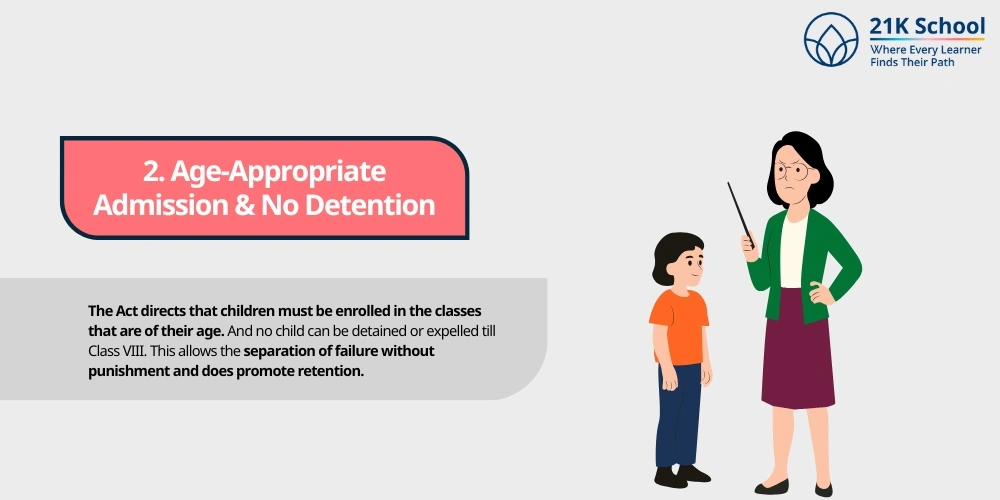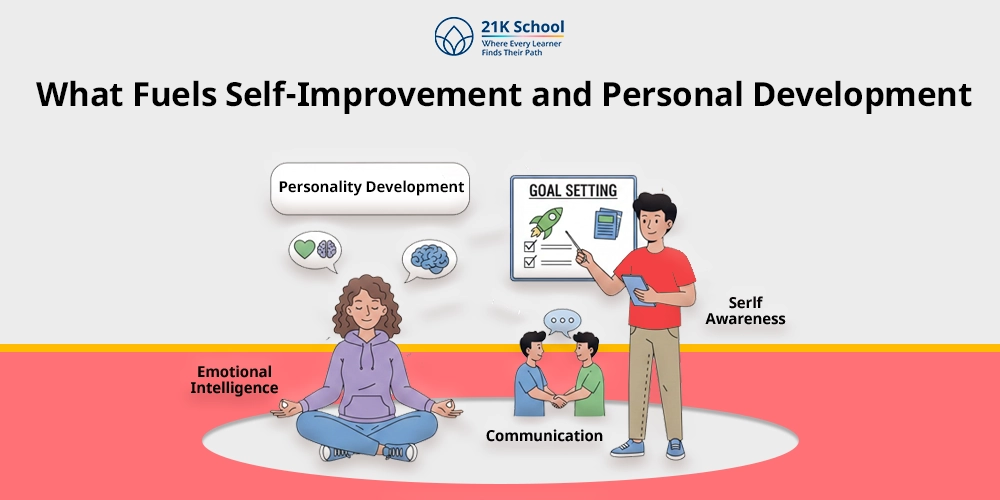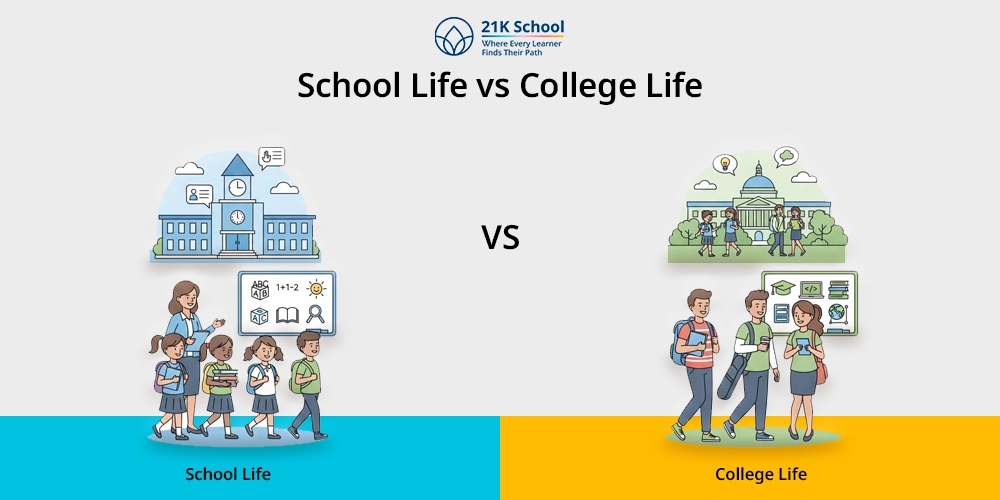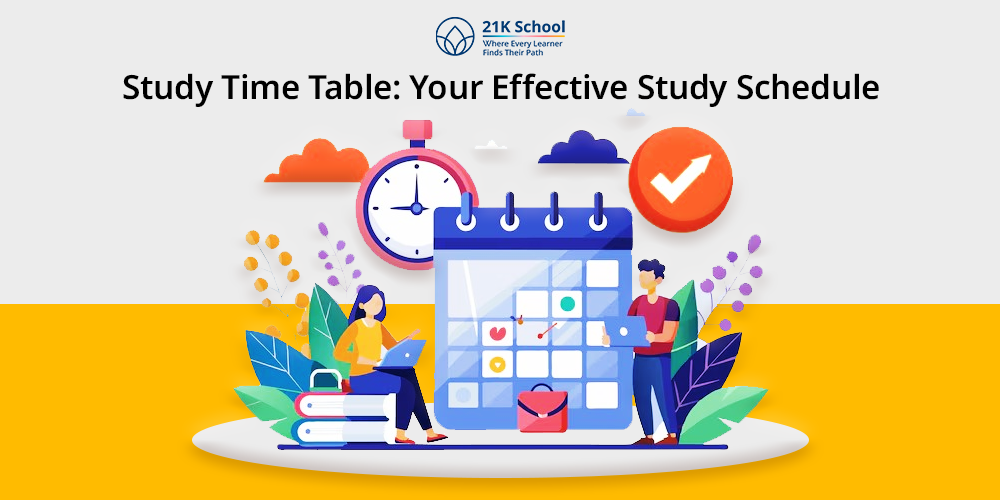
In this fast-moving world of learning, academics, balancing schoolwork, personal goals, and extracurriculars handling can be difficult.
However, the study time table can become learners’ secret weapon to ensure success in academic performance. Study timetable is more than just a daily planner.
It is a personalized learning approach that helps learners stay organized, reduce exam stress, and achieve academic success without last-minute panic.
Also Read: benefits of personalized learning .
Whether you are a school going student or preparing for competitive exams, an effective study schedule is a road to productive learning.
Contents
- What is The Study Time Table?
- Why is The Study Timetable Important for Learners?
- How to Make a Study Time Table?
- How to Maintain a Study Timetable?
- Study Time Table for Class 10 Students
- Study Time Table for Class 12 Students
- Daily Study Time Table for Consistent Learning
- 10 Hours Study Time Table for Focused Preparation
- 12 Hours Study Time Table for Competitive Exams
- 15 Hours Study Time Table for Maximum Efficiency
- 16 Hours Study Time Table for High Achievers
- 18 Hours Study Time Table for Ultra Intensive Preparation
- UPSC Time Table for Study: Crack the Exam with Smart Planning
- Psychology Behind a Study Schedule: Essential Concepts
- Types of Study Time Tables
- Time Table Templates for Different Groups
- Study Timetable Examples
- Benefits of Following a Study Timetable
- Tips to Stick to Your Study Plan
- Common Mistakes to Avoid in a Study Timetable
- Study Time Table Tools and Apps
- Conclusion
What is The Study Time Table?
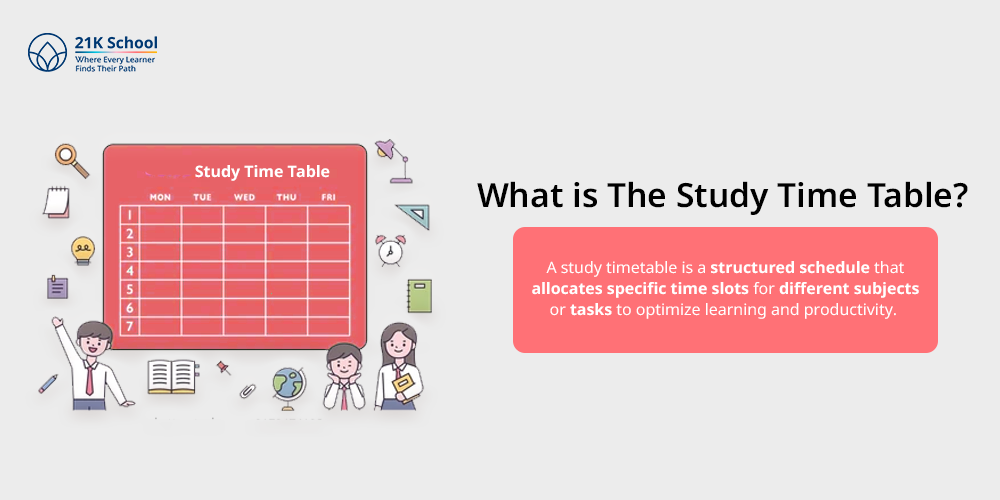
A study timetable is a structured schedule that allocates specific time slots for different subjects or tasks to optimize learning and productivity.
It guides learners towards utilising time effectively, prioritises daily tasks and maintains a healthy balance between studying, rest, and other activities.
Remember, that a good timetable always aligns with learners personal learning style, energy levels, and academic priorities.
Why is The Study Timetable Important for Learners?
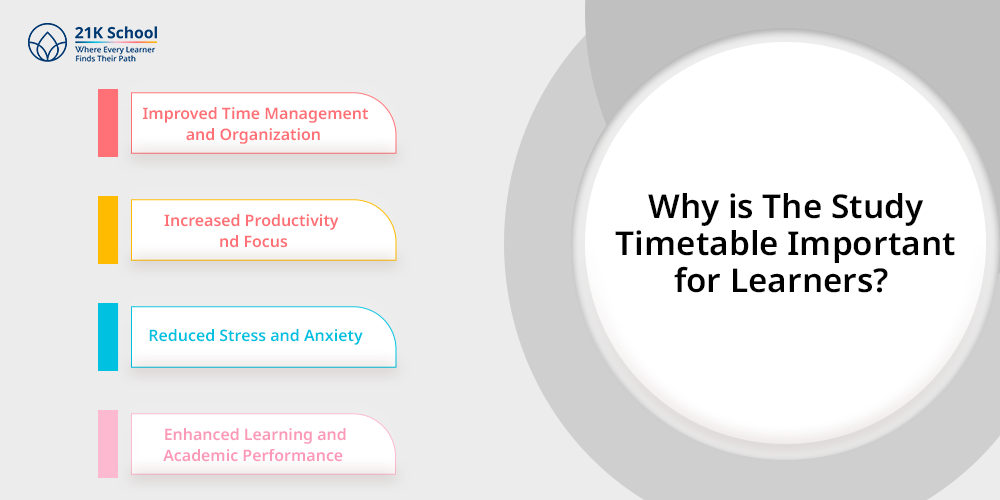
A study timetable is essential for learners because it enhances learners productivity, reduces anxiety and promotes effective time management skills .
Here’s a more detailed information at the importance of a study timetable:
1. Improved Time Management and Organization

The study timetable is ideal for learners when it improves time management and organization.
Explore the importance of time management for students .
This leads to enhanced academic performance and reduced stress. Structure study sessions, prioritizing tasks and managing time can be beneficial.
2. Increased Productivity and Focus

A proper timetable can enhance productivity and focus by promoting structured learning, effective time management, and reduced stress.
Make sure your timetable is not over filled with learnings, it also includes breaks and a mix of different subjects of interest.
3. Reduced Stress and Anxiety
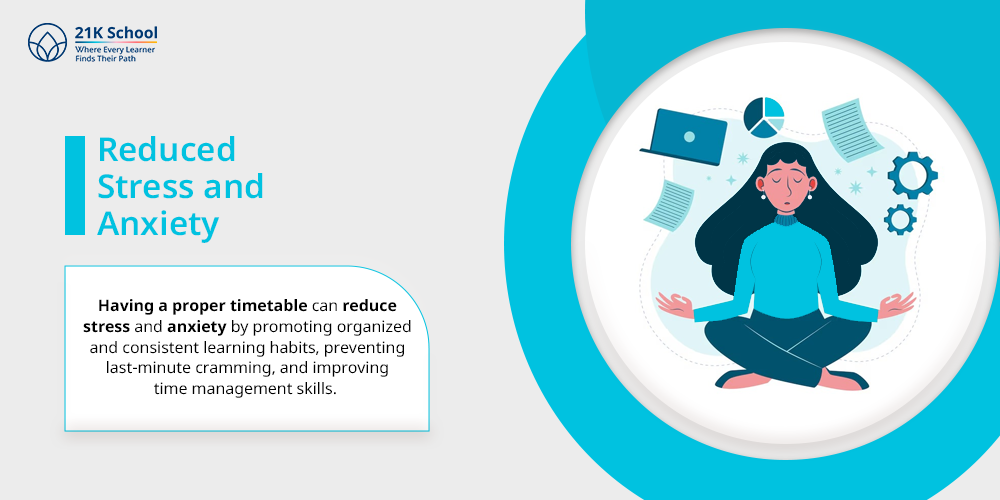
Having a proper timetable can reduce study stress and anxiety by promoting organized and consistent learning habits, preventing last-minute cramming, and improving time management skills.
If you are a student or parent who wants to gain good marks, you must read how students can improve time management skills .
This will help learners to know exactly what to study and when to bring mental clarity and reduce anxiety.
4. Enhanced Learning and Academic Performance

There are various strategies that can enhance learning and academic performance.
For example, effective use of technology, fostering a positive learning environment , and developing strong study habits .
Technology-enhanced learning (TEL) improves student engagement and motivation.
How to Make a Study Time Table?
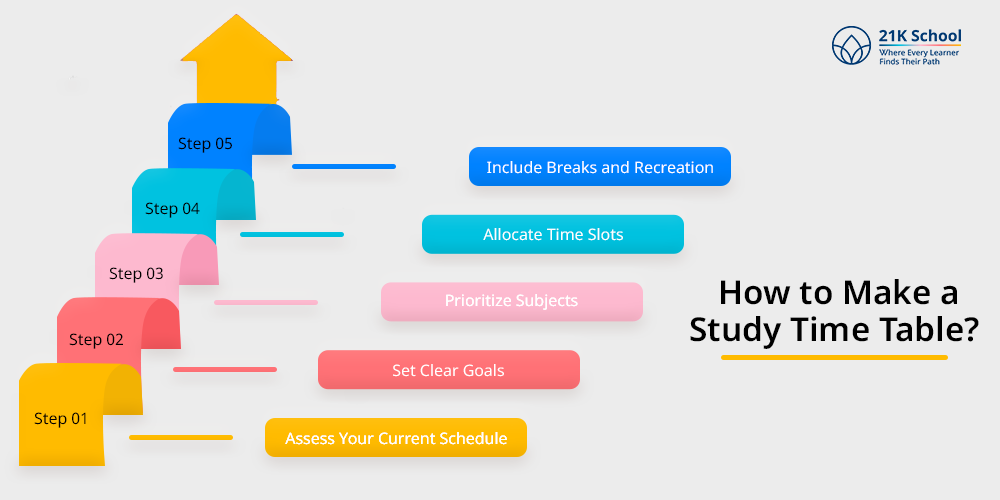
Various learners looking for new and effective ways to learn for their upcoming class, exam or competition should analyse how to make a study time table for learning.
Here’s a quick steps to make a study time table:
- Step 1: Assess Your Current Schedule
Explore the time you have available after your school or college. Also, don’t forget to include sleep, meals, and rest time.
- Step 2: Set Clear Goals
Before making sure you have set clear goals based on academic requirements.
Decide what you want to achieve and break the subject, chapter and topics into daily tasks.
- Step 3: Prioritize Subjects
Keep sessions short within 30 to 45 minutes to fresh up and restart the next session.
Also remember to prioritize the important or difficult subjects to get good marks in exam .
- Step 4: Allocate Time Slots
Every learner has their own way of making timetables. Some love to study in the early morning, others are night owls.
However, remember to allocate time slots for each subject and chapter according to the class curriculum.
- Step 5: Include Breaks and Recreation
Continuous studying can be overwhelming especially for those who recently started following a study timetable.
Learners can use the Pomodoro technique in which learners engage in 25 mins in learning and 5 mins break and repeat.
You can also add time for hobbies, exercise and relaxation.
How to Maintain a Study Timetable?
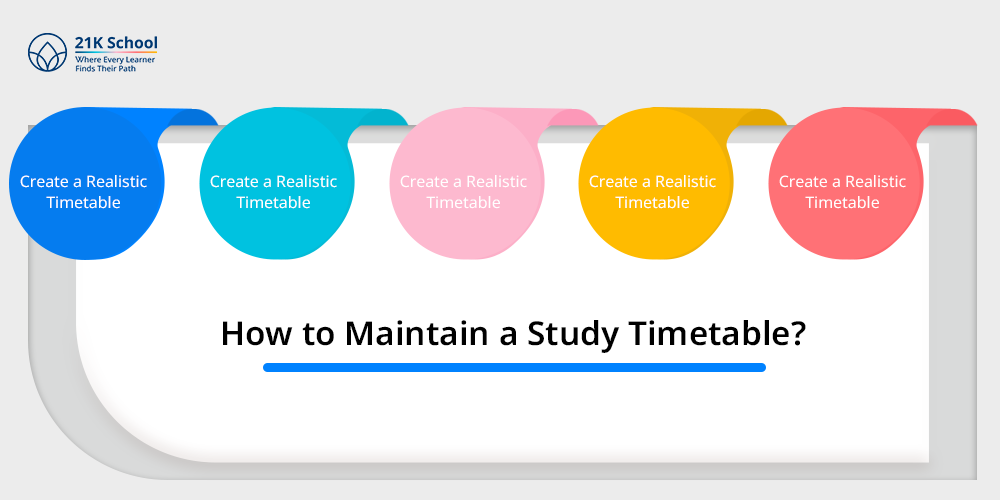
To maintain a study timetable, learners require a combination of good planning, flexibility, and self-discipline.
Here’s how learners can maintain a study timetable:
1. Create a Realistic Timetable
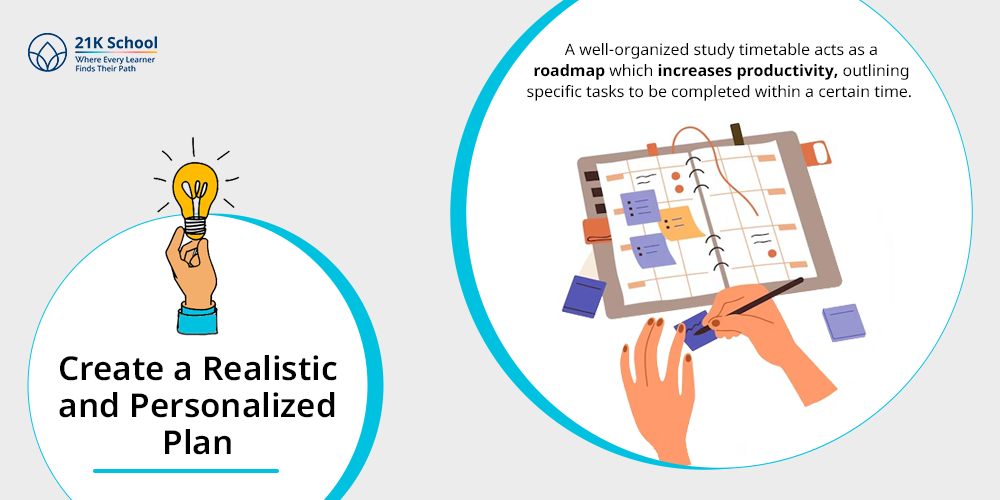
Start by creating a realistic timetable which includes commitment, identify your peak productivity times, break down subjects, allocate time slots with breaks.
Don’t schedule intense 8-12 hour non stop learning. Study with breaks and gradually increase if you feel you can.
2. Make it Visible and Accessible
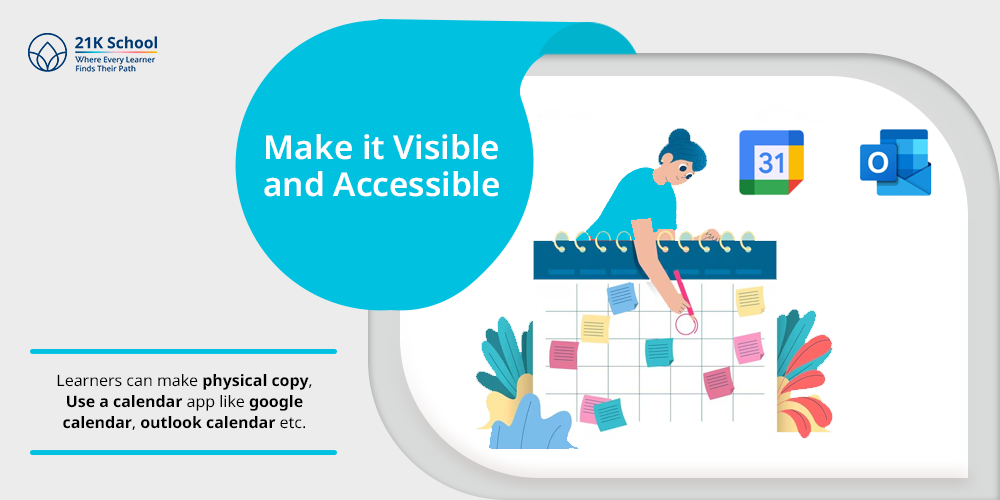
To add a study timetable in daily lifestyle one needs to make it visible and accessible.
Learners can make physical copy, Use a calendar app like google calendar, outlook calendar etc.
3. Stick to It
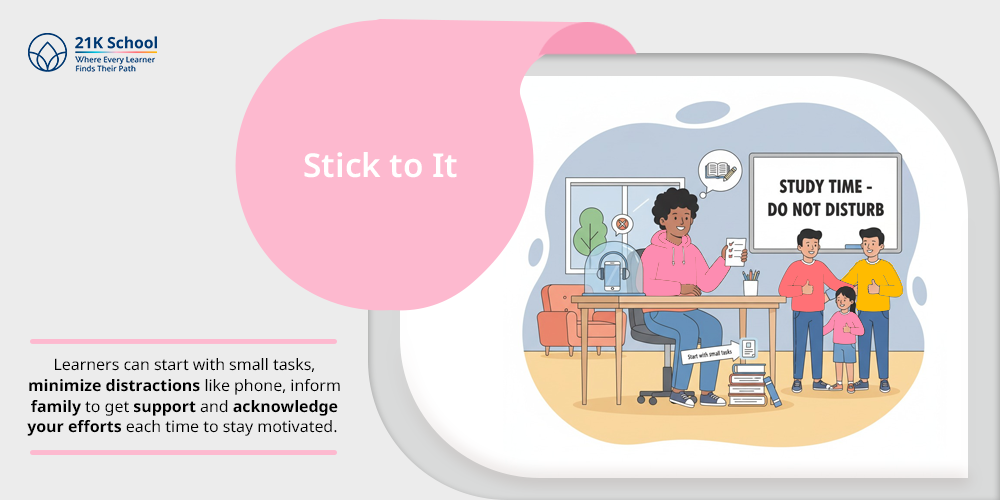
Discipline is key to becoming effective, especially to get academic achievement.
Learners can start with small tasks, minimize distractions like phone, inform family to get support and acknowledge your efforts each time to stay motivated.
4. Be Flexible and Adaptable

In the beginning many learners miss some sessions due to various unexpected circumstances or events like health or function.
However, don’t abandon the topic by finding another time to reschedule that missed session. You can also update your next day schedule accordingly.
5. Strategies to Complete Daily Tasks
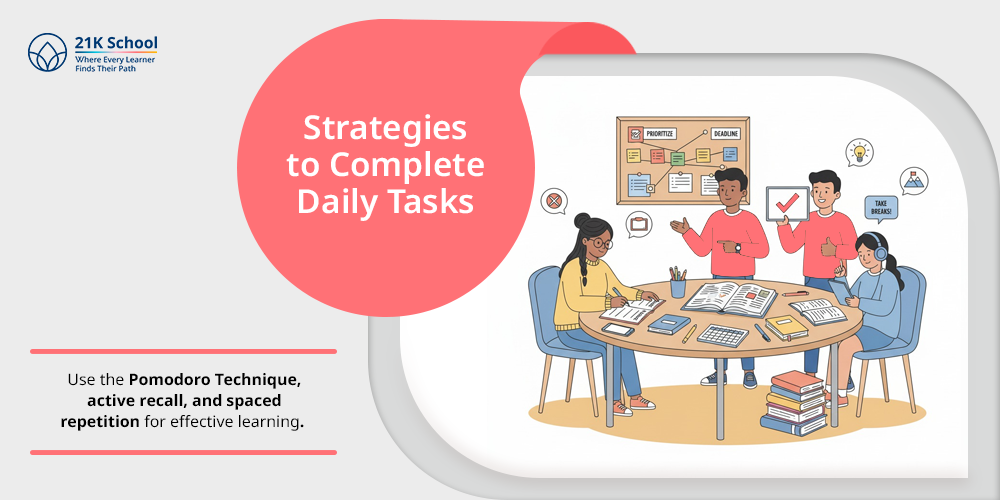
Learners can prioritise tasks by deadlines and difficulty. Use the Pomodoro Technique, active recall, and spaced repetition for effective learning.
You must stay hydrated, sleep well, and be patient. Building habits takes time and progress matters more than perfection. Stay consistent and celebrate small wins.
Study Time Table for Class 10 Students
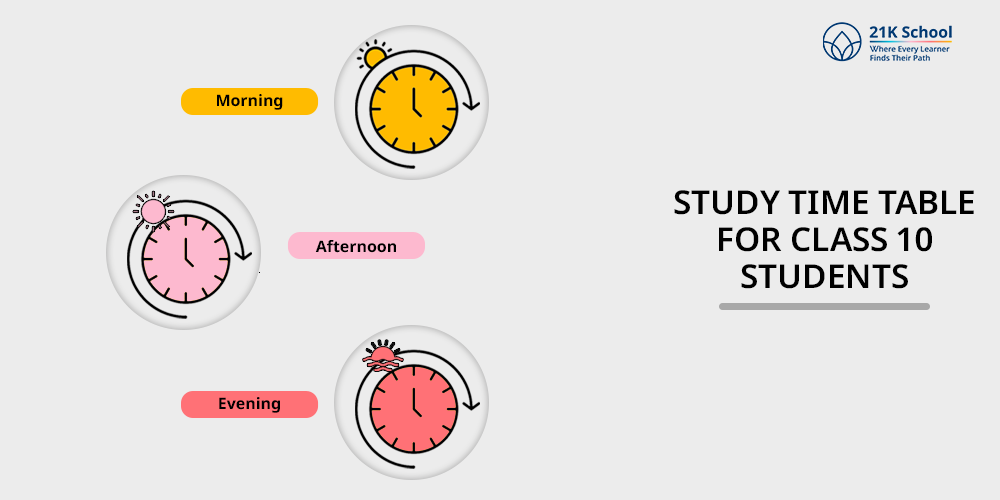
Learners with a well-structured study timetable for a class 10 have various elements which are dedicated study blocks for each subject, including breaks, and enough time for revision and practice.
If you are going to create one, remember to include a mix of focused study, practice papers, and revision sessions.
It’s also crucial for learners to include time such as meals time, relaxation time, and physical activities such as gross motor skills , fine motor skills , etc.
Here’s a possible timetable structure:
Morning:
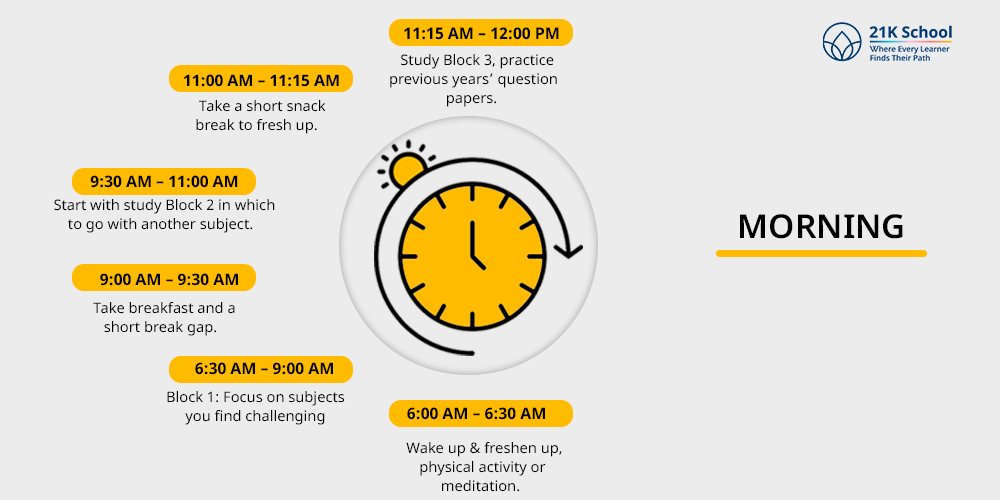
- 6:00 AM – 6:30 AM: Wake up & freshen up, then engage in light physical activity or meditation.
- 6:30 AM – 9:00 AM: Start with study Block 1 in which focus on subjects you find challenging or prefer to study early in the day. Learners can use this time primarily on memorising, working through textbooks, and making notes.
- 9:00 AM – 9:30 AM: Take breakfast and a short break gap.
- 9:30 AM – 11:00 AM: Start with study Block 2 in which to go with another subject. Or you can continue with the same subject and understand concepts and practise important questions.
- 11:00 AM – 11:15 AM: After completion take a short snack break to fresh up.
- 11:15 AM – 12:00 PM: Then study Block 3 in which you can practice previous years’ question papers.
Afternoon:
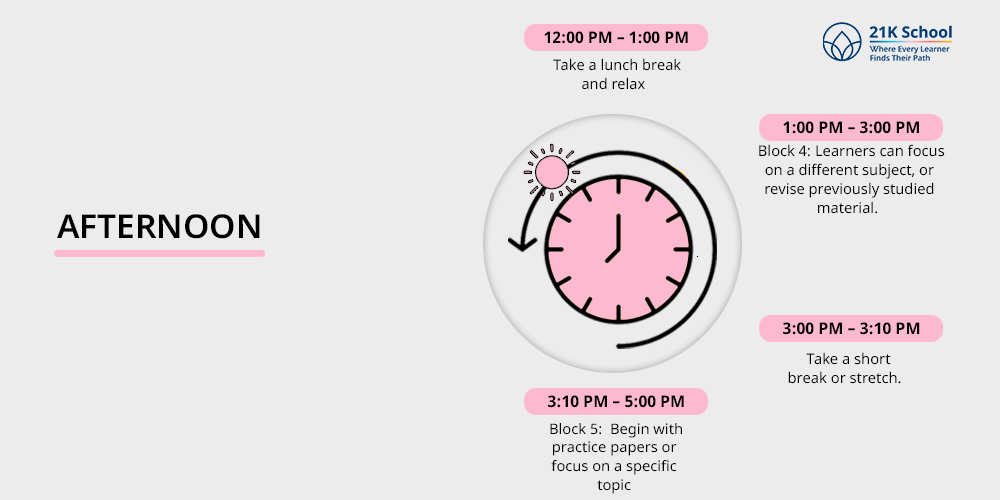
- 12:00 PM – 1:00 PM: After the first shift, take a lunch break and relax.
- 1:00 PM – 3:00 PM: Start with studying Block 4. Here, learners can focus on a different subject, or revise previously studied material.
- 3:00 PM – 3:10 PM: Take a short break or stretch.
- 3:10 PM – 5:00 PM: In study Block 5 begin with practice papers or focus on a specific topic that requires more time to prepare or special attention.
Evening:
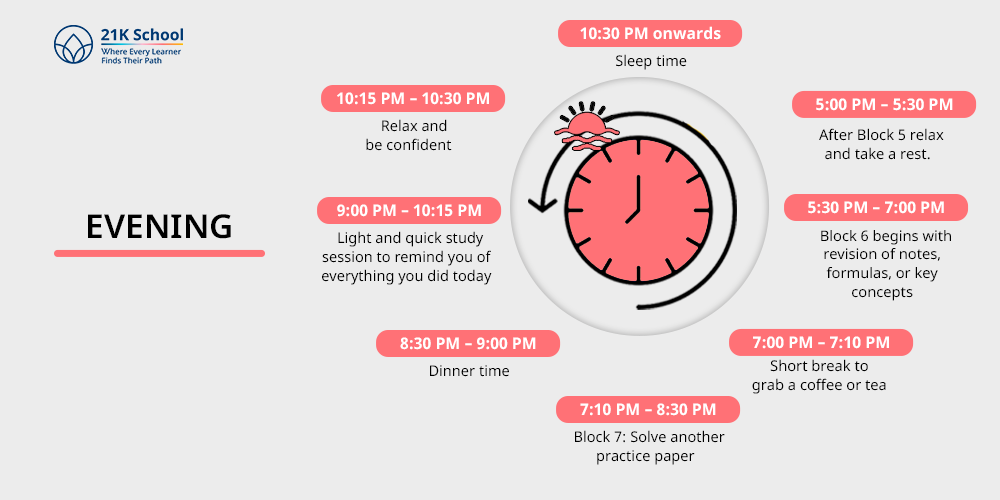
- 5:00 PM – 5:30 PM: After completing Block 5 relax and take a rest.
- 5:30 PM – 7:00 PM: In study Block 6 begins with revision of notes, formulas, or key concepts.
- 7:00 PM – 7:10 PM: Short break to grab a coffee or tea for refreshment.
- 7:10 PM – 8:30 PM: Study Block 7: Solve another practice paper and track your study progress .
- 8:30 PM – 9:00 PM: Dinner time.
- 9:00 PM – 10:15 PM: Light and quick study session to remind you of everything you did today. It can be reading or reviewing notes.
- 10:15 PM – 10:30 PM: Relax and be confident to start a new day before bed.
- 10:30 PM onwards: Sleep time.
Study Time Table for Class 12 Students
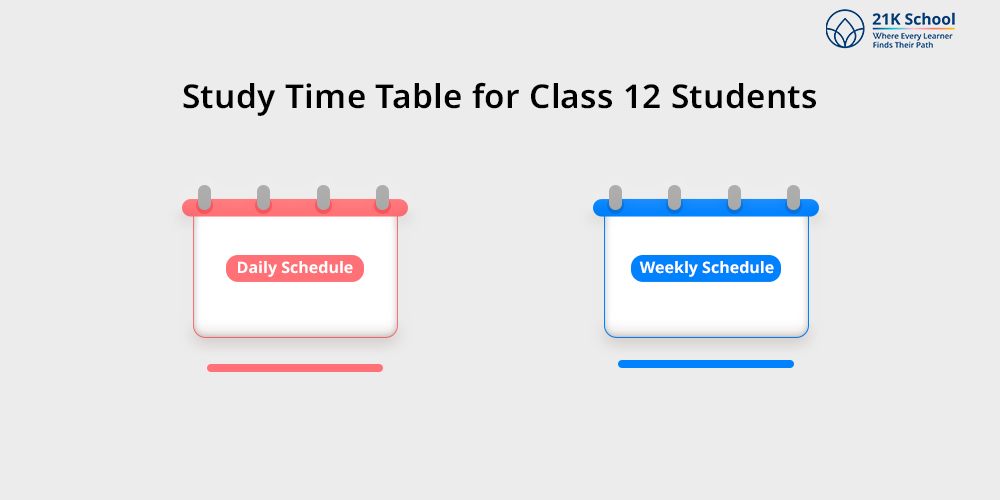
Class 12th is a crucial stage of every student’s life. It comes with both happiness and exam stress . However, having a right timetable for Class 12 students can be an ideal option.
A timetable should include several things like study slots for each subject, including time for revision, practice, and breaks.
While making the timetable individuals should ensure their learning styles and preferences. It will balance academic work and personal well-being.
Here’s a quick timetable especially designed for Class 12 students:
Daily Schedule:
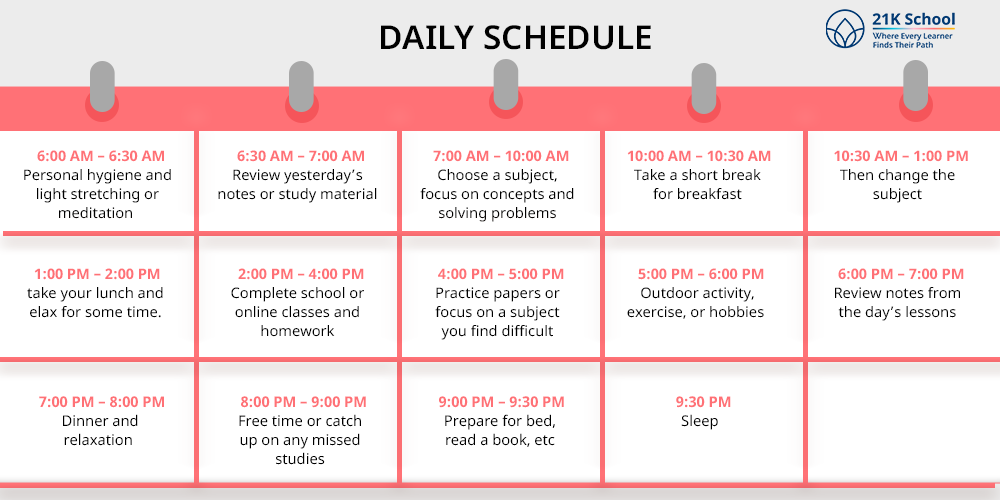
- 6:00 AM – 6:30 AM: Start your day with personal hygiene and light stretching or meditation for strength.
- 6:30 AM – 7:00 AM: Then first review yesterday’s notes or study material you have already done.
- 7:00 AM – 10:00 AM: Choose a subject such as Math or Science and focus on understanding concepts and solving problems.
- 10:00 AM – 10:30 AM: Take a short break for breakfast.
- 10:30 AM – 1:00 PM: Then change the subject. You can choose one that requires more memorization.
- 1:00 PM – 2:00 PM: After completion, take your lunch and relax for some time.
- 2:00 PM – 4:00 PM: Make sure you are completing school or online classes and homework.
- 4:00 PM – 5:00 PM: Practice papers or focus on a subject you find difficult.
- 5:00 PM – 6:00 PM: Outdoor activity, exercise, or hobbies.
- 6:00 PM – 7:00 PM: Review notes from the day’s lessons and prepare for the next day.
- 7:00 PM – 8:00 PM: Dinner and relaxation.
- 8:00 PM – 9:00 PM: Free time or catch up on any missed studies.
- 9:00 PM – 9:30 PM: Prepare for bed, read a book, or engage in a relaxing activity.
- 9:30 PM: Sleep.
Weekly Schedule:
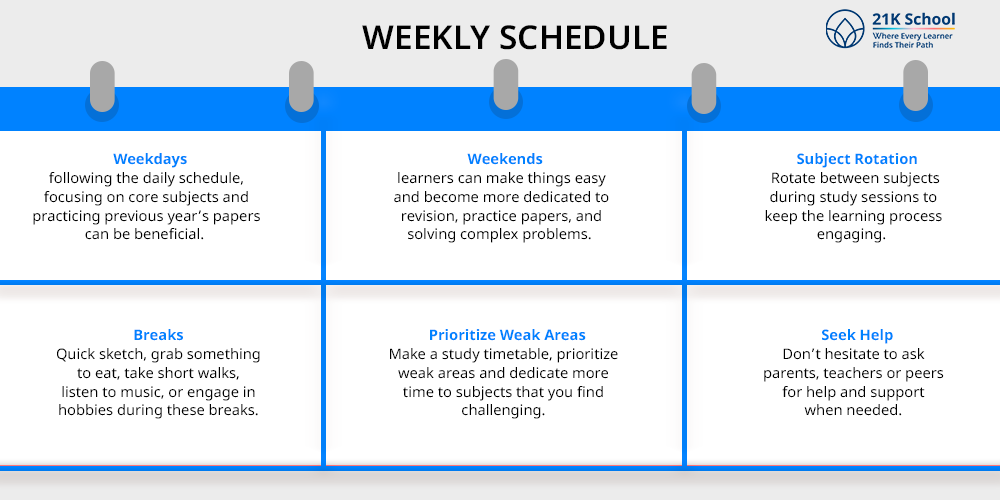
- Weekdays
Weekdays are filled with work but following the daily schedule, focusing on core subjects and practicing previous year’s papers can be beneficial.
- Weekends
On weekends learners can make things easy and become more dedicated to revision, practice papers, and solving complex problems.
Don’t learn new concepts, give one day for relaxation and catching up on any missed work.
- Subject Rotation
Each subject is important, that’s why rotate between subjects during study sessions to keep the learning process engaging.
- Breaks
Learning is crucial but don’t overload yourself with a lot of topics. Ensure regular breaks during study sessions to avoid burnout.
Take a quick sketch, grab something to eat, take short walks, listen to music, or engage in hobbies during these breaks.
- Prioritize Weak Areas
Each individual or their habits are not the same. Some are good at math and need less time while others find it difficult which requires comparatively more time.
Make a study timetable, prioritize weak areas and dedicate more time to subjects that you find challenging.
- Seek Help
While improving daily habits related to academic performance you may face many challenges such as tiredness, hard questions or distractions.
Don’t hesitate to ask parents, teachers or peers for help and support when needed.
Daily Study Time Table for Consistent Learning
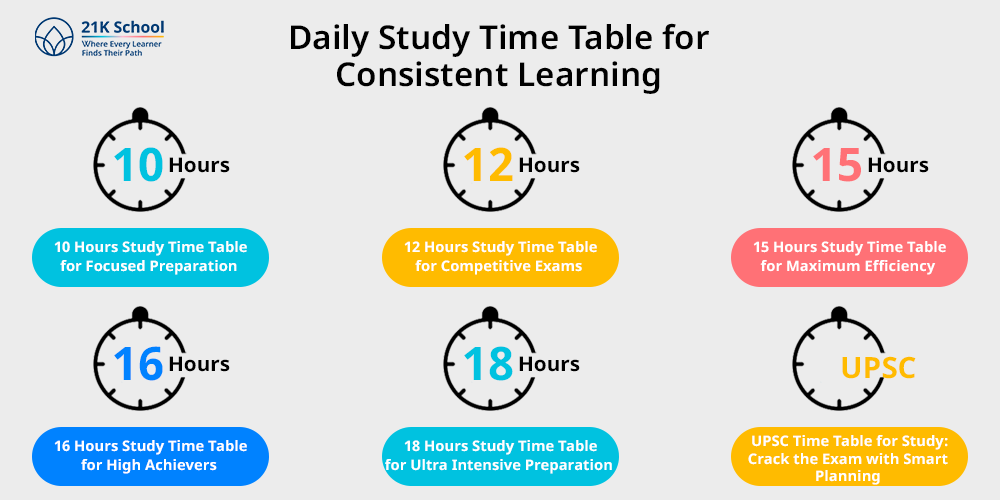
A daily study time table is important for consistent learning of students. Having a structure around your natural energy levels is essential for motivation.
One must prioritise challenging subjects when you’re most alert, and includes regular breaks to maintain focus.
It’s crucial for learners to balance study timetable with adequate rest, meals, and activities you enjoy to prevent burnout.
With the help of accurate timetable learners can align their learning style and energy levels. Establishing consistent learning habits and improving the overall academic performance should be the motto.
10 Hours Study Time Table for Focused Preparation
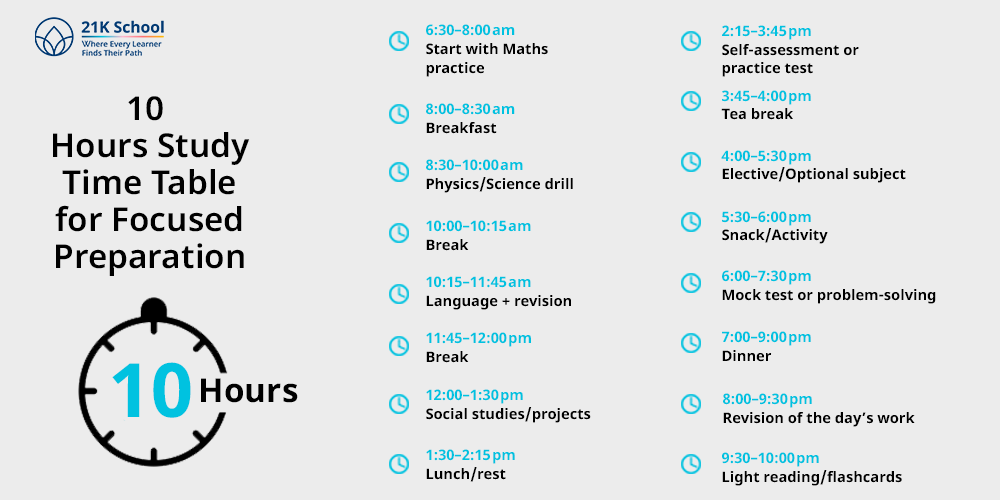
Are you someone looking for a 10-hour study schedule?
If yes, then requirements should be carefully planned and aligned which includes everything from breaks to important subjects.
Here you can go through a maintained and focused study timetable ideal for intense pre-exam cycles to avoid burnout:
6:30–8:00 am – Start with Maths practice
8:00–8:30 am – Breakfast
8:30–10:00 am – Physics/Science drill
10:00–10:15 am – Break
10:15–11:45 am – Language + revision
11:45–12:00 pm – Break
12:00–1:30 pm – Social studies/projects
1:30–2:15 pm – Lunch/rest
2:15–3:45 pm – Self-assessment or practice test
3:45–4:00 pm – Tea break
4:00–5:30 pm – Elective/Optional subject
5:30–6:00 pm – Snack/Activity
6:00–7:30 pm – Mock test or problem-solving
7:30–8:00 pm – Dinner
8:00–9:30 pm – Revision of the day’s work
9:30–10:00 pm – Light reading/flashcards
12 Hours Study Time Table for Competitive Exams
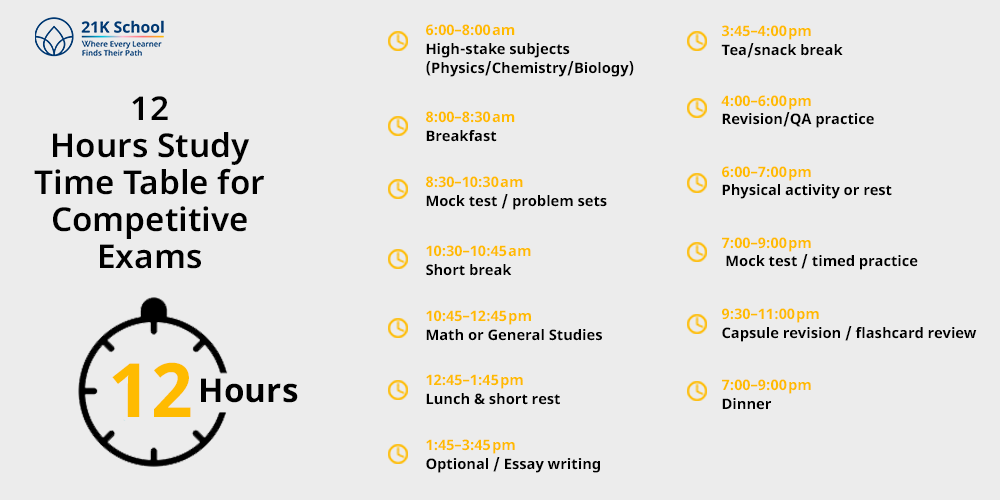
For competitive exams such as JEE, NEET, UPSC Prelims. Learners should give a 12-hour study schedule. It will help aspirants to focus and prioritize studies.
Here’s a more detailed breakdown of a 12 hour study schedule:
6:00–8:00 am – High-stake subjects (Physics/Chemistry/Biology)
8:00–8:30 am – Breakfast
8:30–10:30 am – Mock test / problem sets
10:30–10:45 am – Short break
10:45–12:45 pm – Math or General Studies
12:45–1:45 pm – Lunch & short rest
1:45–3:45 pm – Optional / Essay writing
3:45–4:00 pm – Tea/snack break
4:00–6:00 pm – Revision/QA practice
6:00–7:00 pm – Physical activity or rest
7:00–9:00 pm – Mock test / timed practice
9:00–9:30 pm – Dinner
9:30–11:00 pm – Capsule revision / flashcard review
15 Hours Study Time Table for Maximum Efficiency
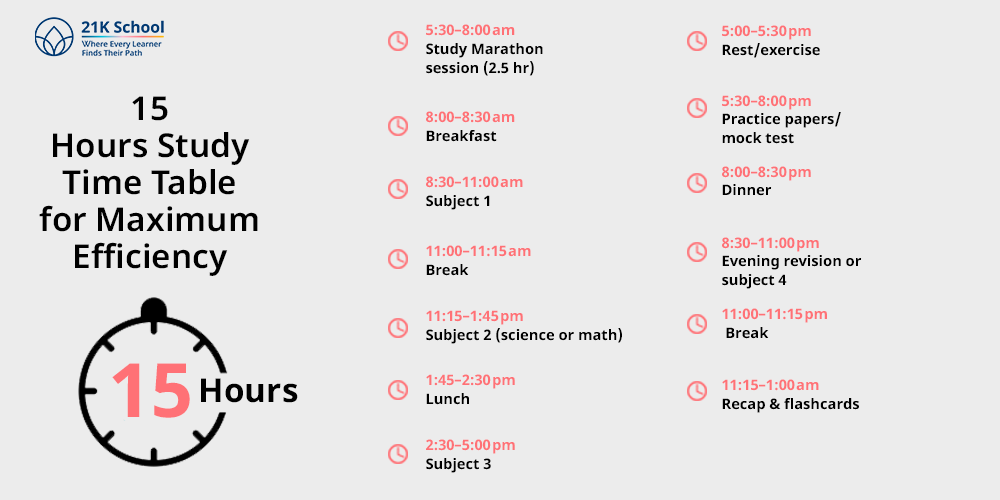
There are many learners looking for a 15-hour study schedule. The 15 Hours Study Time Table is one of the ideal choices to maximize efficiency with good marks.
However, it needs careful considerations and analysis to improve learning and prevent last minute exam stress.
Learners need to understand that regular breaks, prioritize sleep are also crucial in a good study timetable. So, adjust the schedule based on the needs and learning styles.
Here is a clear breakdown of the following:
5:30–8:00 am – Study Marathon session (2.5 hr)
8:00–8:30 am – Breakfast
8:30–11:00 am – Subject 1
11:00–11:15 am – Break
11:15–1:45 pm – Subject 2 (science or math)
1:45–2:30 pm – Lunch
2:30–5:00 pm – Subject 3
5:00–5:30 pm – Rest/exercise
5:30–8:00 pm – Practice papers/mock test
8:00–8:30 pm – Dinner
8:30–11:00 pm – Evening revision or subject 4
11:00–11:15 pm – Break
11:15–1:00 am – Recap & flashcards
Based on learners’ demand this 15 hour study timetable is ideal for students. Try out to see the maximum results.
16 Hours Study Time Table for High Achievers
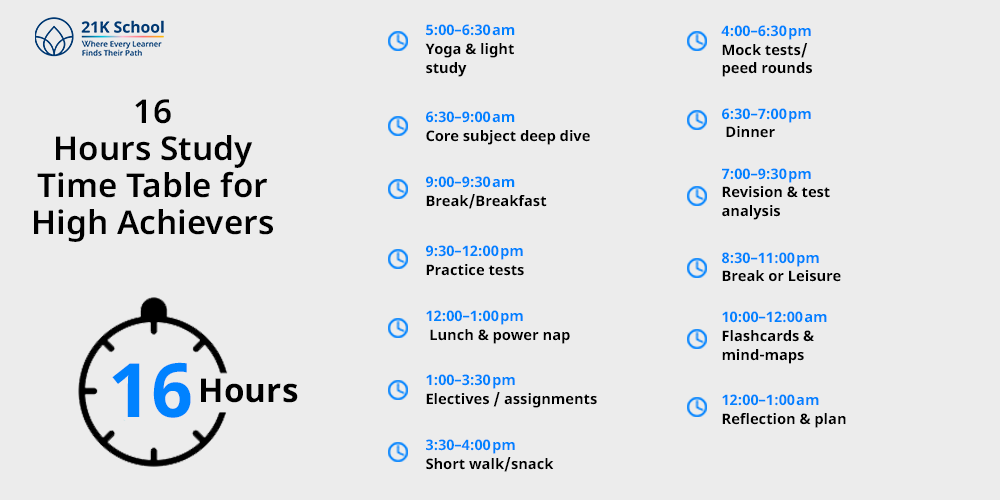
If you are seeking an intense 16-hour study timetable, you are at the right place. The following information can be beneficial for high achievers.
But remember you can also customize it to avoid challenges and maintain effectiveness. However, it is important to include regular breaks, varied study activities and a healthy lifestyle.
Here you can get a 16-hour study timetable for learners. It is an ideal demo adaptable to individual preferences and subject needs:
5:00–6:30 am – Yoga & light study
6:30–9:00 am – Core subject deep dive
9:00–9:30 am – Break/Breakfast
9:30–12:00 pm – Practice tests
12:00–1:00 pm – Lunch & power nap
1:00–3:30 pm – Electives / assignments
3:30–4:00 pm – Short walk/snack
4:00–6:30 pm – Mock tests/speed rounds
6:30–7:00 pm – Dinner
7:00–9:30 pm – Revision & test analysis
9:30–10:00 pm – Break or Leisure
10:00–12:00 am – Flashcards & mind-maps
12:00–1:00 am – Reflection & plan
18 Hours Study Time Table for Ultra Intensive Preparation
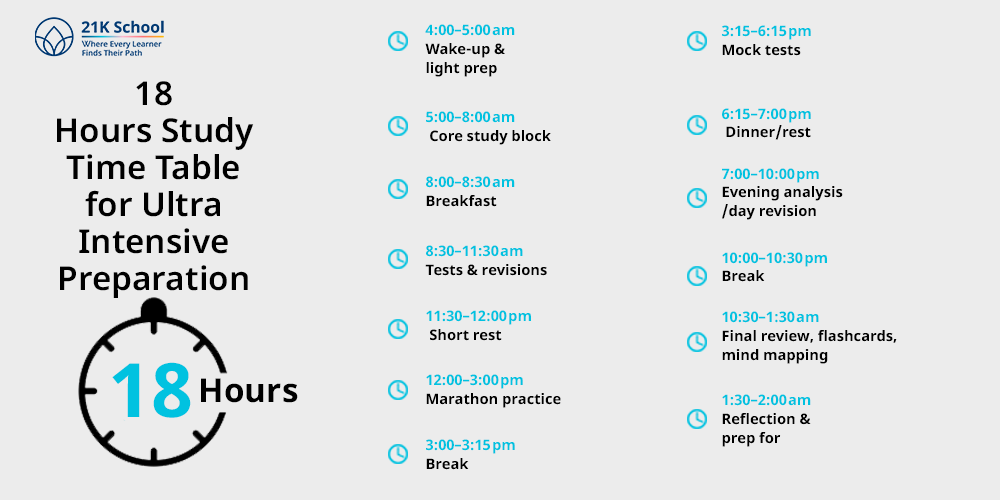
Many learners are very motivated towards their exams or competitions and want an 18 hours study time table for ultra intensive preparation.
To fulfill their needs here’s a demo of 18 hours study time table for ultra intensive preparation:
4:00–5:00 am – Wake-up & light prep
5:00–8:00 am – Core study block
8:00–8:30 am – Breakfast
8:30–11:30 am – Tests & revisions
11:30–12:00 pm – Short rest
12:00–3:00 pm – Marathon practice
3:00–3:15 pm – Break
3:15–6:15 pm – Mock tests
6:15–7:00 pm – Dinner/rest
7:00–10:00 pm – Evening analysis/day revision
10:00–10:30 pm – Break
10:30–1:30 am – Final review, flashcards, mind mapping
1:30–2:00 am – Reflection & prep for
UPSC Time Table for Study: Crack the Exam with Smart Planning
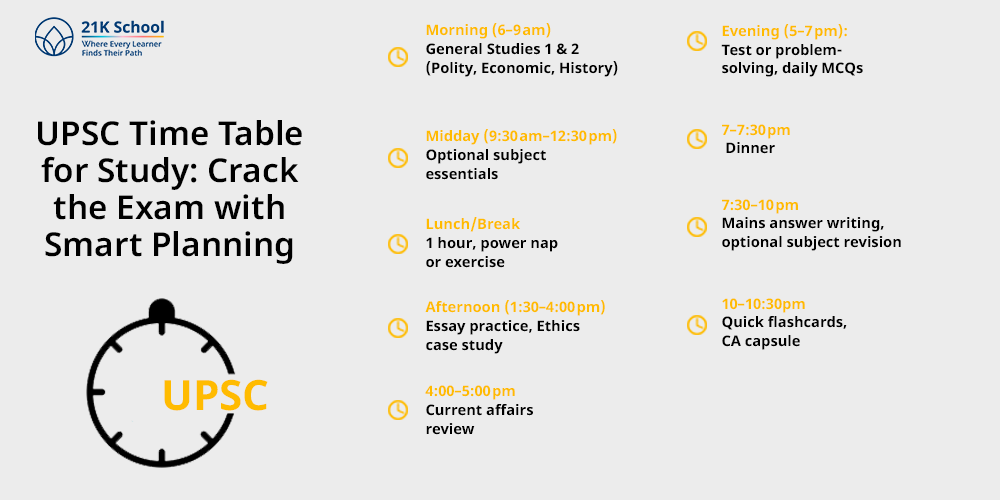
As a UPSC aspirant, learners are always busy learning. But a systematic learning can leads to end goal:
UPSC has many level exams, prelims, mains, and optional subjects which require well-rounded preparation. Here’s a demo of study time table for learners:
Morning (6–9 am): General Studies 1 & 2 (Polity, Economic, History).
Midday (9:30 am–12:30 pm): Optional subject essentials.
Lunch/Break: 1 hour, power nap or exercise.
Afternoon (1:30–4:00 pm): Essay practice, Ethics case study.
4:00–5:00 pm: Current affairs review.
Evening (5–7 pm): Test or problem-solving, daily MCQs.
7–7:30 pm: Dinner
7:30–10 pm: Mains answer writing, optional subject revision.
10–10:30pm: Quick flashcards, CA capsule.
Psychology Behind a Study Schedule: Essential Concepts
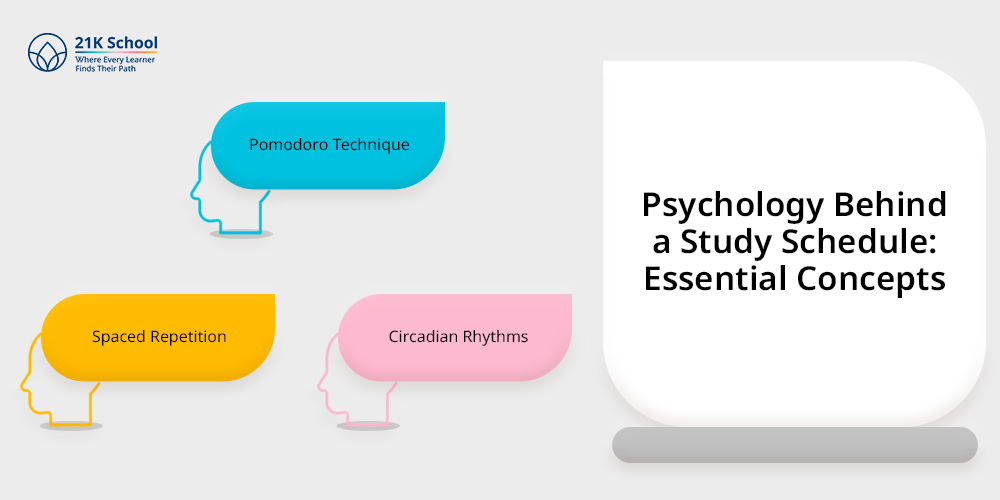
Psychology behind a study schedule is simply, it makes learning easy. By optimizing everything from time to technique learners can reach their goal.
Here’s a technique beneficial for each learner:
1. Pomodoro Technique
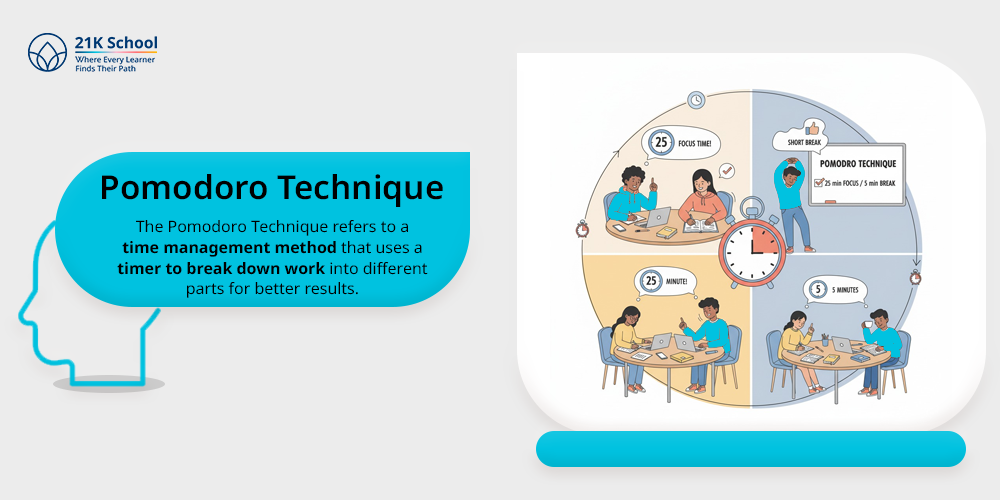
The Pomodoro Technique refers to a time management method that uses a timer to break down work into different parts for better results.
Understand the importance of time management in exams .
Here, learners focused on 25-minute intervals, separated by short breaks, to improve focus and productivity.
After every four intervals, a longer break is taken. The process is ideal for kids who distract themselves in long lectures.
2. Spaced Repetition
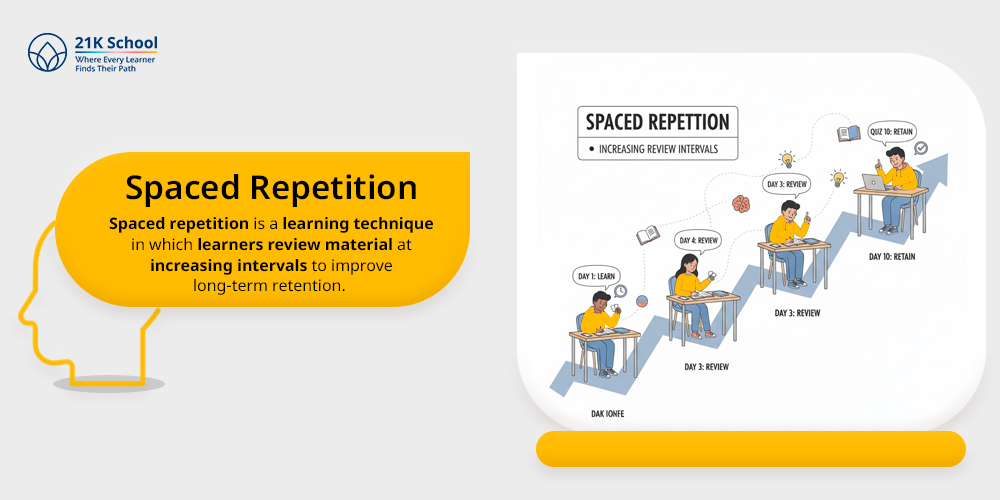
Spaced repetition is a learning technique in which learners review material at increasing intervals to improve long-term retention.
As we know our brain forgets old things especially when time passes but to retain it one needs to regularly review and revise.
The process helps in strengthening memory and makes it easier to recall information later. It is an ideal approach for intense learning.
3. Circadian Rhythms
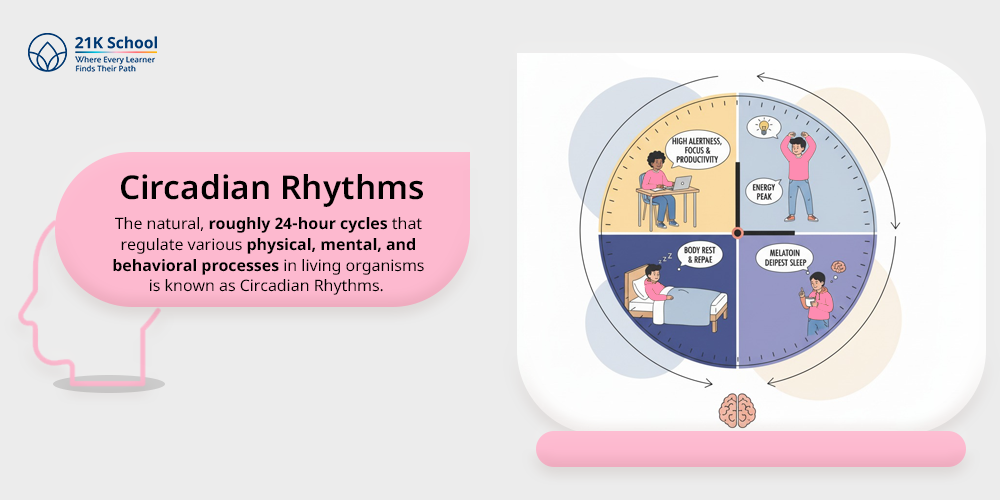
The natural, roughly 24-hour cycles that regulate various physical, mental, and behavioral processes in living organisms is known as Circadian Rhythms.
These rhythms are driven by an internal biological clock and are influenced by external cues like light and darkness.
It affects sleep, hormone levels, body temperature, and more.
Types of Study Time Tables
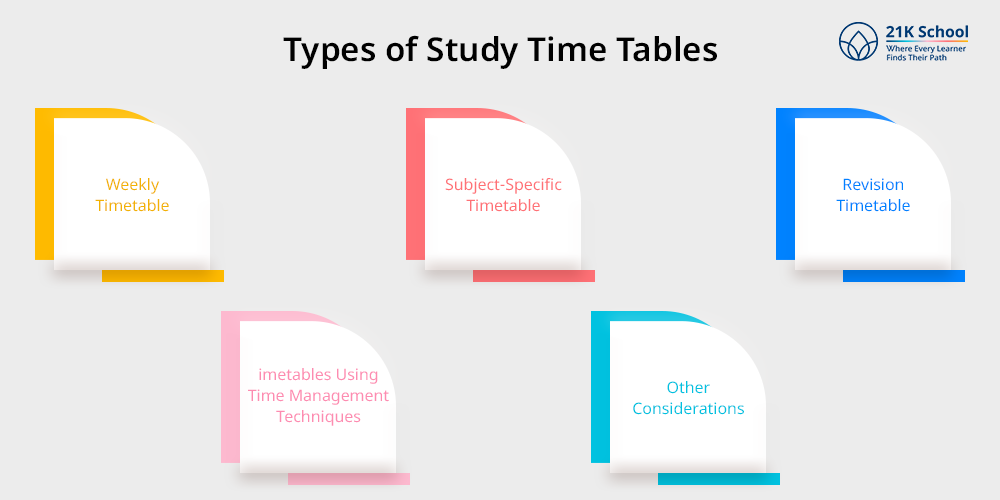
As we know each individual and their learning style are different. To focus on studies one can choose from some common types of study timetable.
For example general study time tables, subject-specific time tables, revision time tables, exam-focused time tables etc. Let’s explore some major types:
1. Weekly Timetable
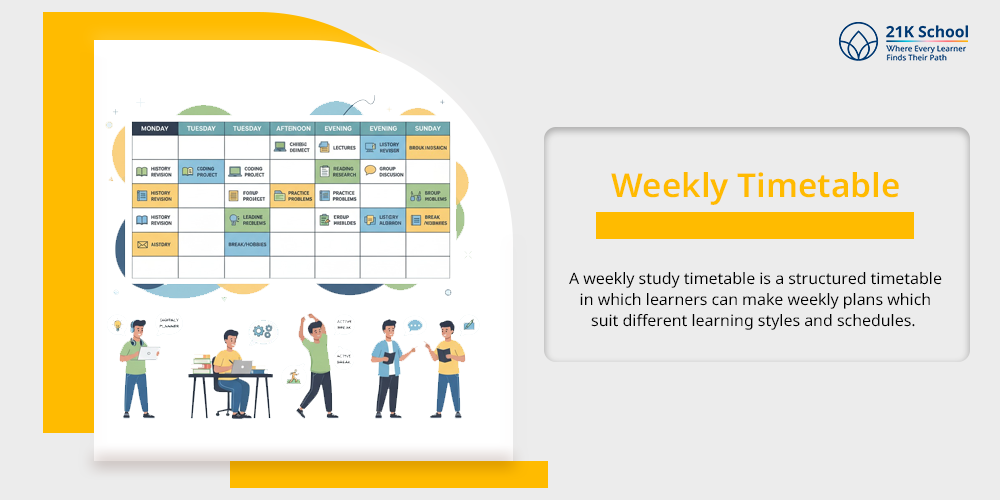
A weekly study timetable is a structured timetable in which learners can make weekly plans which suit different learning styles and schedules.
Some common types learners like include linear, block, and prioritized timetables, each with its own approach to organizing study time.
2. Subject-Specific Timetable
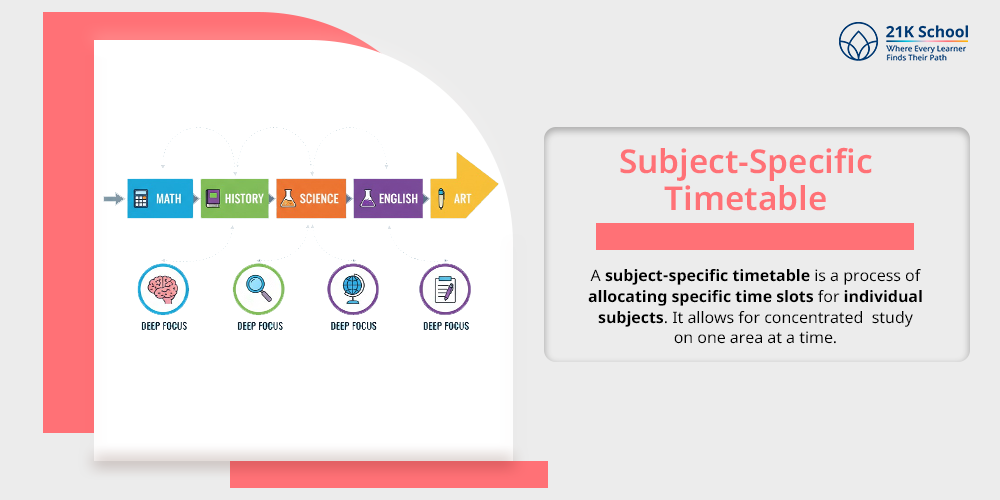
A subject-specific timetable is a process of allocating specific time slots for individual subjects. It allows for concentrated study on one area at a time.
The method is very helpful for learners preparing for exams or those who find it challenging to switch between different subjects without losing focus.
3. Revision Timetable
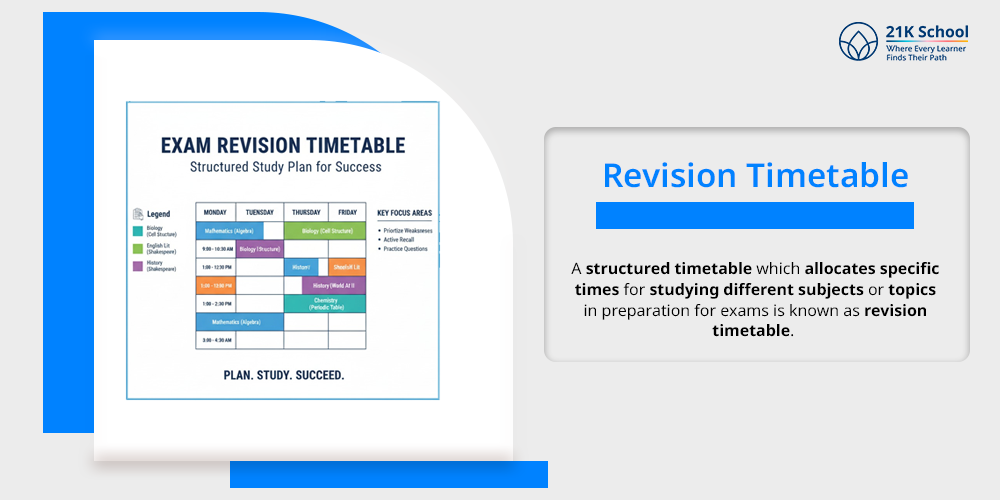
A structured timetable which allocates specific times for studying different subjects or topics in preparation for exams is known as revision timetable.
With revision timetable learners can stay organized, manage their time effectively, and reduce exam-related stress.
4. Timetables Using Time Management Techniques
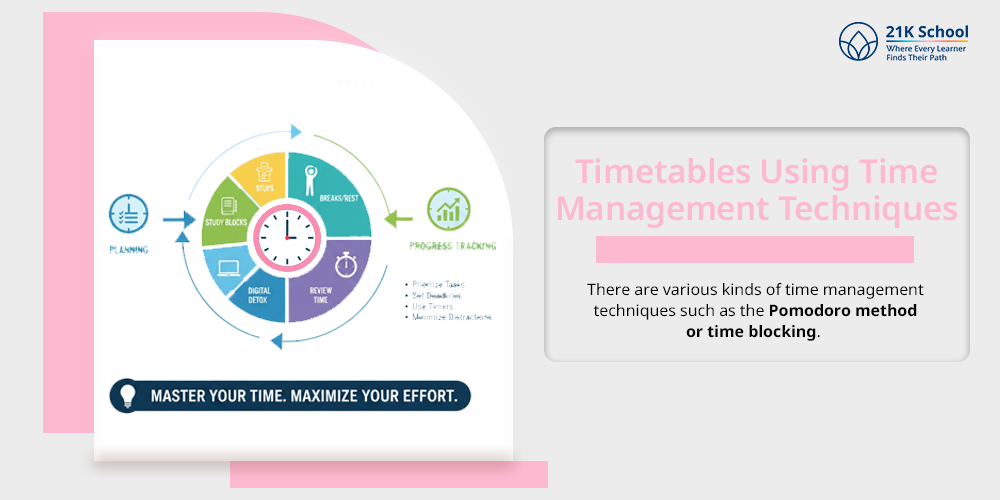
Timetables using time-management techniques is an ideal way for learners to manage their time and effort.
There are various kinds of time management techniques such as the Pomodoro method or time blocking.
5. Other Considerations
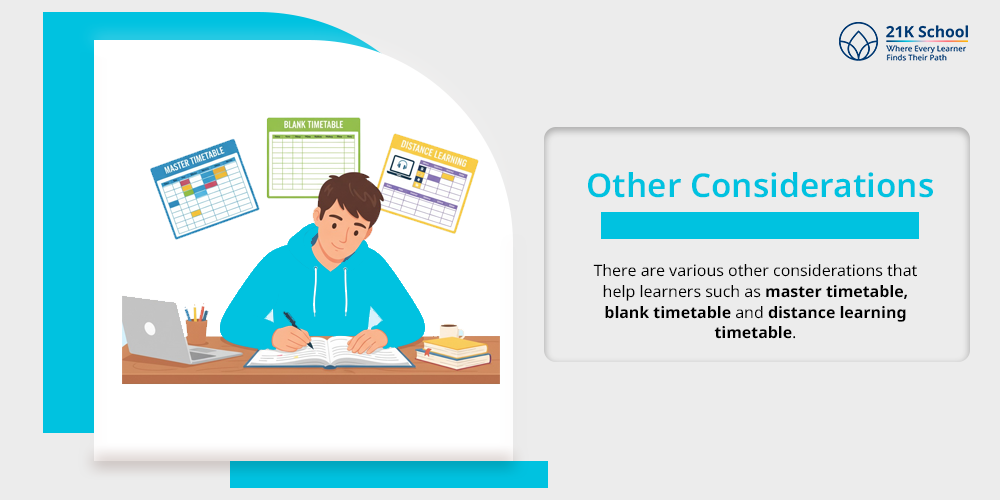
There are various other considerations that help learners such as master timetable, blank timetable and distance learning timetable.
Time Table Templates for Different Groups
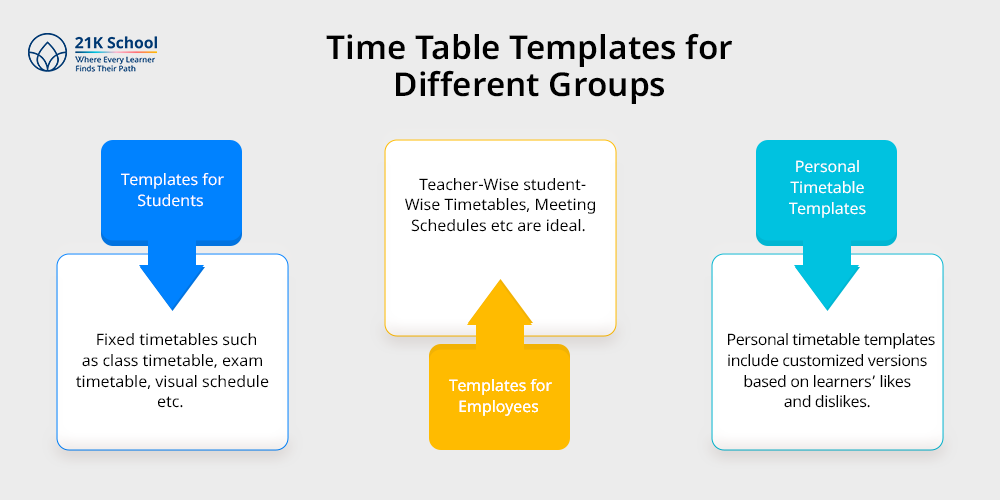
Timetable templates are especially designed for individuals based on their work. can be customized for students, teachers, and employees.
Here’s a detailed information for all types of study timetable user:
- Templates for Students
Students mostly use fixed timetables such as class timetable, exam timetable, visual schedule etc.
Each had its own unique features which guide them for better academic achievement.
- Templates for Employees
Templates for employees consist of Teacher-Wise student-Wise Timetables, Meeting Schedules etc are ideal.
With their busy schedules at work learners can also manage both learning and work.
- Personal Timetable Templates
Personal timetable templates include customized versions based on learners’ likes and dislikes. For example some like color coding, digital, physical or with icons.
Study Timetable Examples
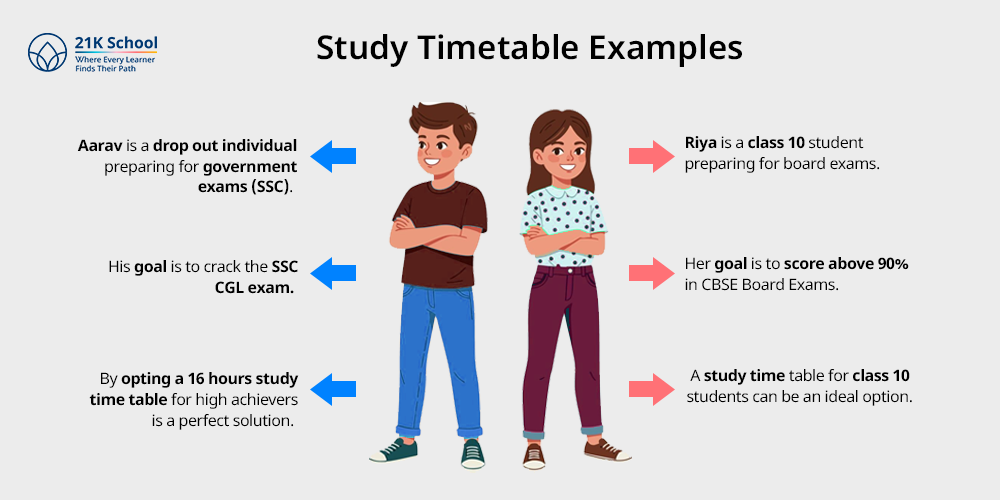
- Riya is a class 10 student preparing for board exams. Her goal is to score above 90% in CBSE Board Exams.
Her academic challenge is that she is easily distracted and overwhelmed by long study hours. A study time table for class 10 students can be an ideal option.
- Aarav is a drop out individual preparing for government exams (SSC). His goal is to crack the SSC CGL exam.
However, his problem is to focus on studies by optimizing his time and he is finding it difficult with lots of subjects.
By opting a 16 hours study time table for high achievers is a perfect solution.
Benefits of Following a Study Timetable
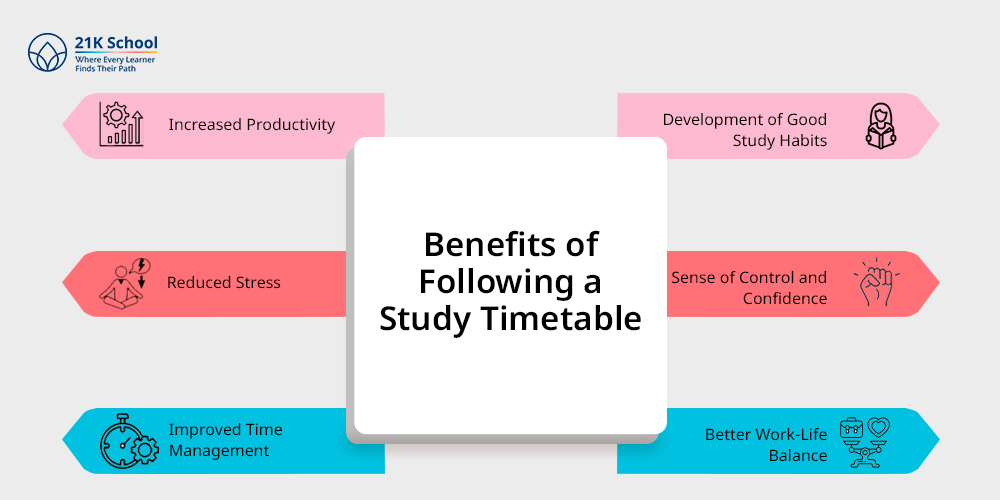
1. Increased Productivity
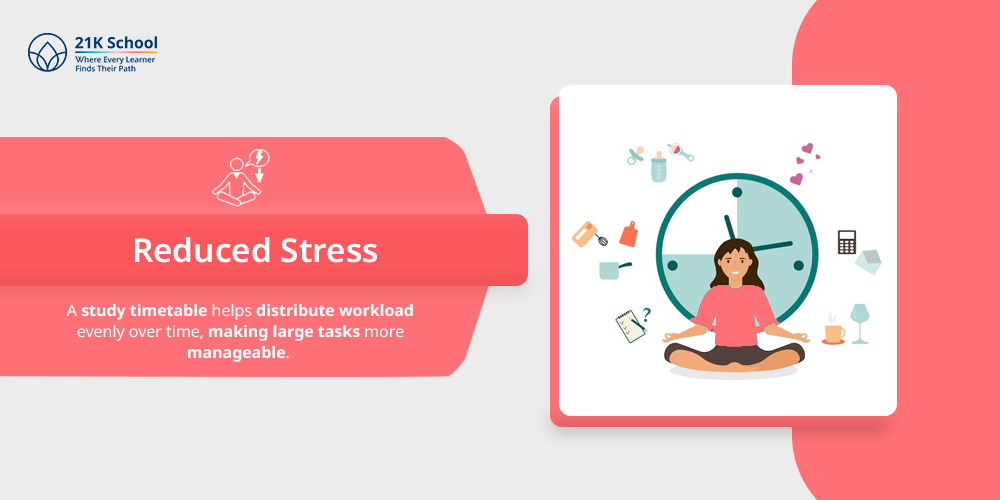
A well-organized study timetable acts as a roadmap which increases productivity, outlining specific tasks to be completed within a certain time.
When you know what you’re supposed to do and when to do it, you waste less time wondering where to begin.
This clear direction helps in avoiding procrastination and staying focused, which significantly boosts productivity.
2. Reduced Stress
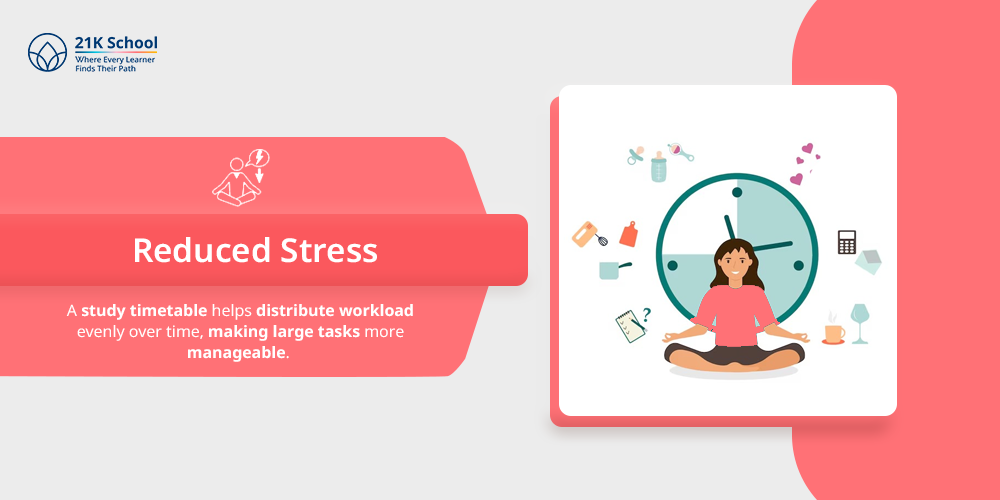
Academic stress often stems from last-minute cramming, missed deadlines, or volume of unfinished tasks.
A study timetable helps distribute workload evenly over time, making large tasks more manageable.
With consistent progress and a clear overview of what’s been completed and what remains, students feel more in control, reducing anxiety and stress levels.
Learn how can students cope with study stress .
3. Improved Time Management
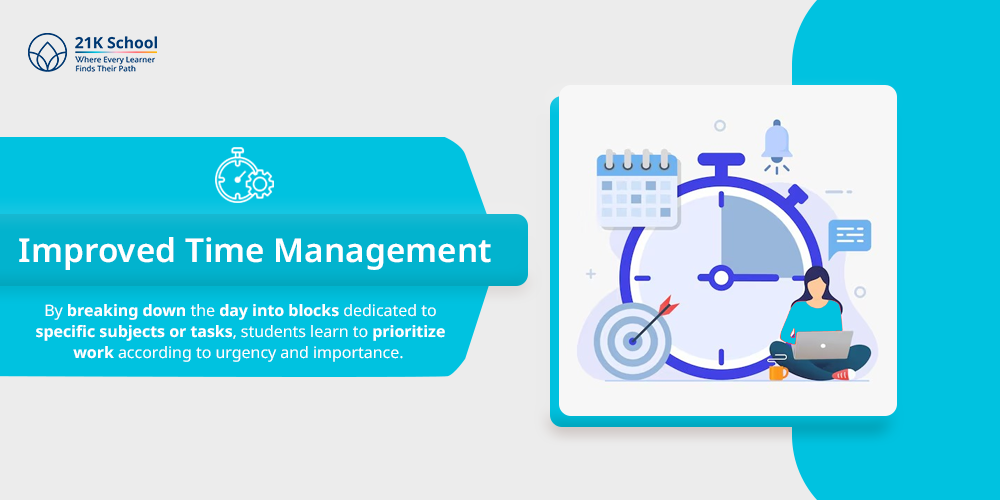
A major benefit of a study timetable is to improve time management skills. By breaking down the day into blocks dedicated to specific subjects or tasks, students learn to prioritize work according to urgency and importance.
These skills are not just valuable in school but carry over into professional and personal life, enabling individuals to handle multiple responsibilities with greater efficiency.
4. Development of Good Study Habits
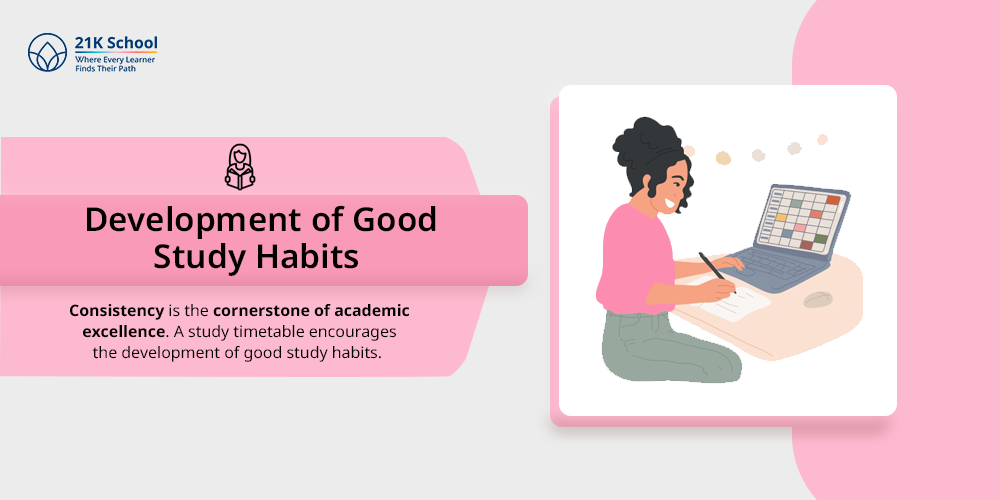
Consistency is the cornerstone of academic excellence. A study timetable encourages the development of good study habits.
Over time, these habits become ingrained, making learning a natural and less stressful process.
Developing a routine also helps in building discipline and a sense of commitment to one’s goals.
5. Sense of Control and Confidence
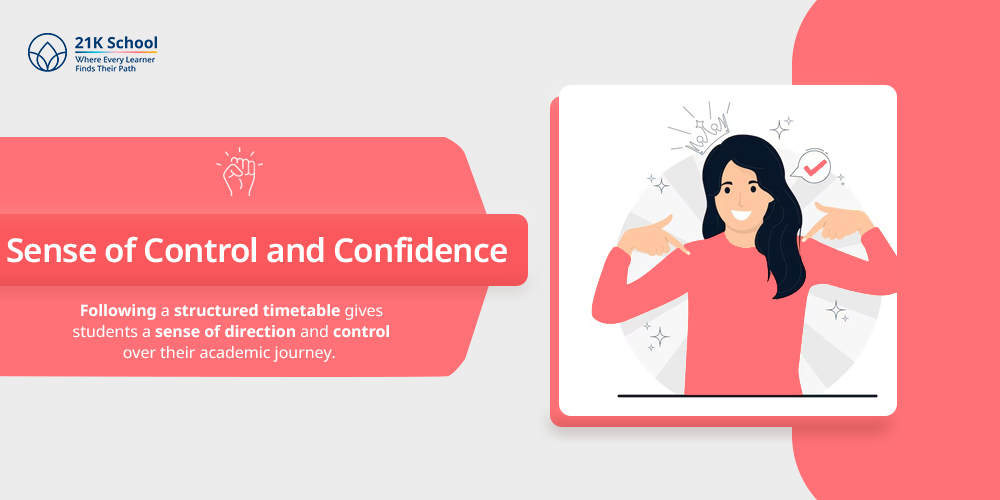
Following a structured timetable gives students a sense of direction and control over their academic journey.
Knowing what to study, when, and how provides clarity and removes confusion, which in turn fosters confidence.
This psychological boost often translates into better performance in tests and assignments, as students feel prepared and empowered.
6. Better Work-Life Balance
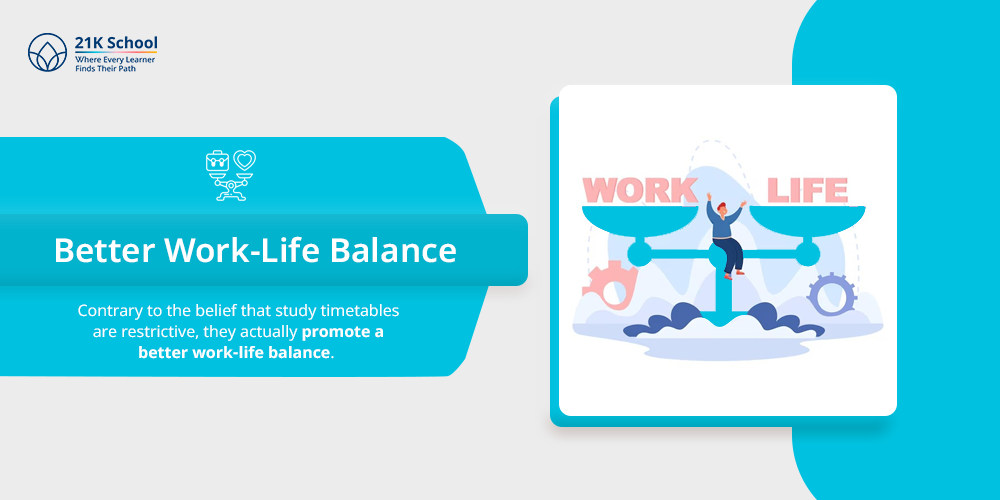
Contrary to the belief that study timetables are restrictive, they actually promote a better work-life balance.
By allocating time not only for study but also for hobbies, social interaction, exercise, and rest, students can maintain a well-rounded lifestyle.
This balance prevents burnout, increases motivation, and enhances overall well-being.
Tips to Stick to Your Study Plan
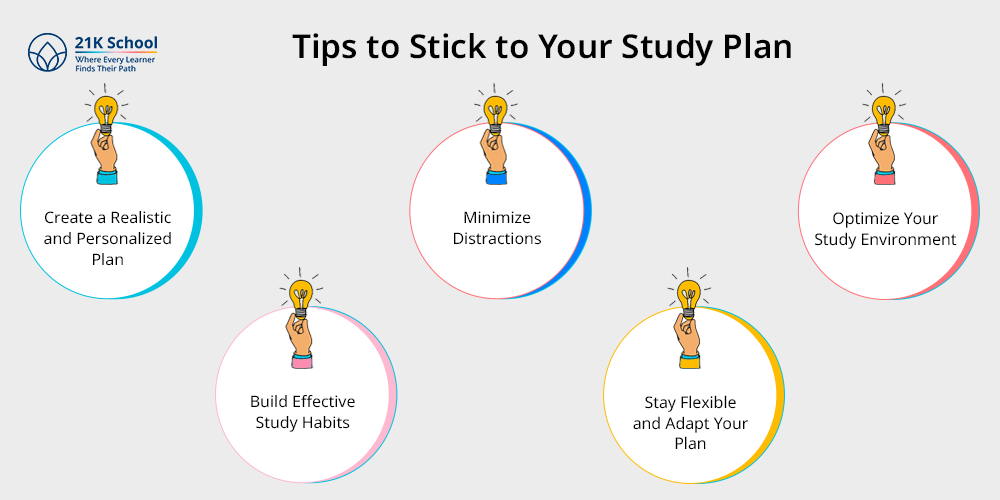
Creating a study timetable is the first step to start a routine. But the real challenge lies in sticking to it.
Below are some practical tips to help students remain committed to their plan.
1. Create a Realistic and Personalized Plan
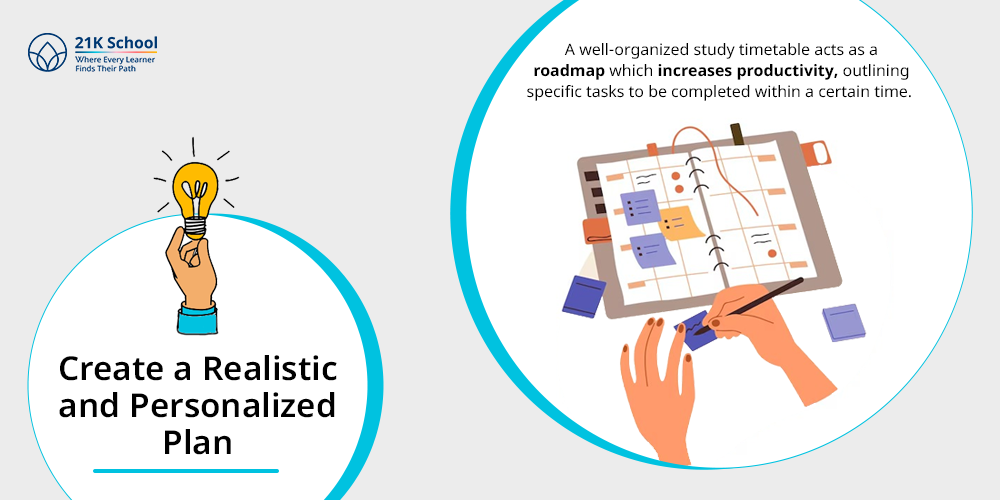
A study timetable should reflect your personal learning style, daily routine, and academic goals.
Avoid copying someone else’s schedule. Instead, assess your most productive hours, subjects requiring more attention, and extracurricular obligations.
Start with a basic weekly layout and gradually refine it based on what works for you. Unrealistic plans that demand long hours of non-stop studying are likely to fail.
2. Minimize Distractions
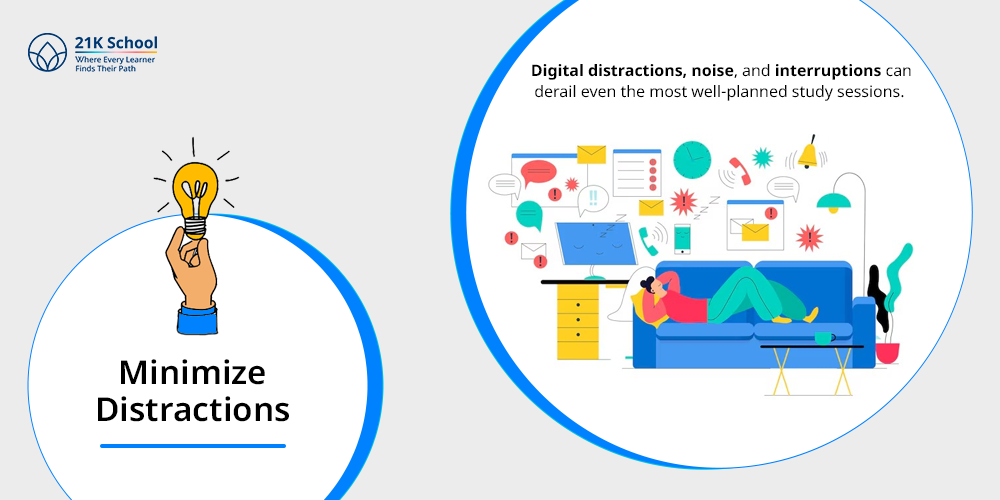
Digital distractions, noise, and interruptions can derail even the most well-planned study sessions.
Identify your primary sources of distraction and take proactive steps to eliminate them.
This could involve turning off notifications, using productivity apps, studying in a quiet place, or informing family members of your study hours. .
3. Optimize Your Study Environment

Your physical environment plays a crucial role in how well you study.
Choose a clean, well-lit, and comfortable space with all necessary materials like books, notebooks, pens, etc within reach.
Avoid studying in bed or in places associated with relaxation. A designated study space sends a psychological signal to your brain that it’s time to focus.
4. Build Effective Study Habits
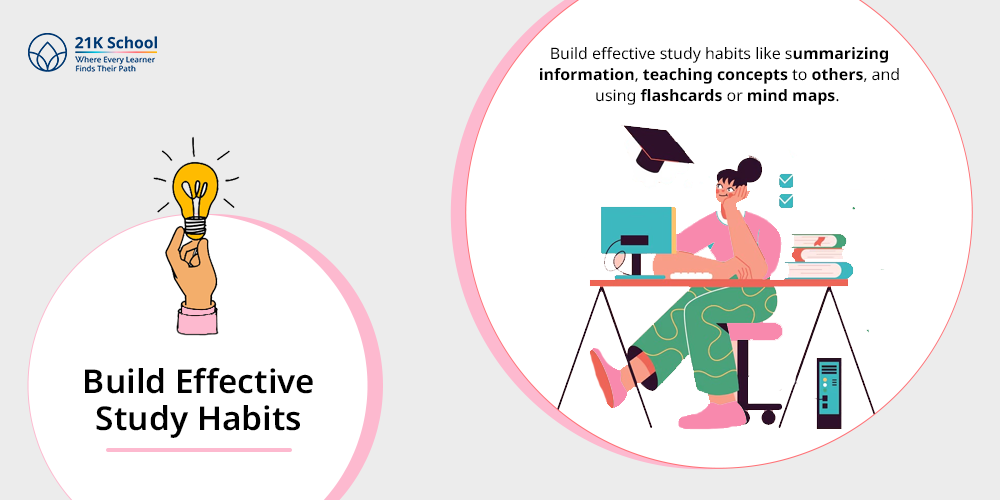
Build effective study habits like summarizing information, teaching concepts to others, and using flashcards or mind maps.
Schedule regular revision sessions and set clear, achievable goals for each study block.
Use the Pomodoro technique or similar time management methods to stay sharp and avoid fatigue.
5. Stay Flexible and Adapt Your Plan

Life is unpredictable, and unexpected events may disrupt your routine. Staying flexible and adapting your plan is key to maintaining a sustainable study timetable.
Instead of abandoning the entire plan, adjust it to accommodate changes.
Review your timetable weekly and make necessary adjustments based on upcoming exams, assignments, or new commitments.
Also explore the best study tips for slow leaners .
Common Mistakes to Avoid in a Study Timetable
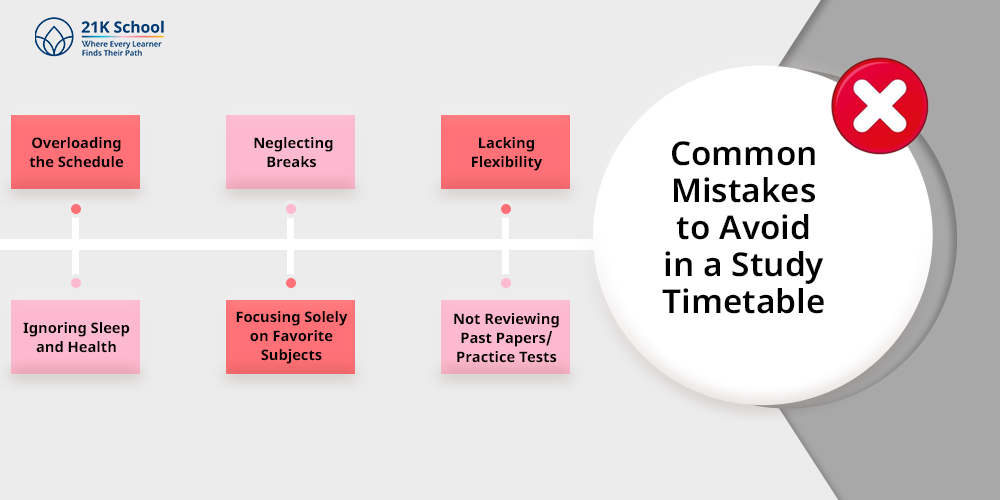
Even with the best intentions, students sometimes make mistakes that reduce the effectiveness of their study timetable.
Being aware of these pitfalls can help you avoid them. Here’s some common mistakes to avoid in a study timetable:
1. Overloading the Schedule
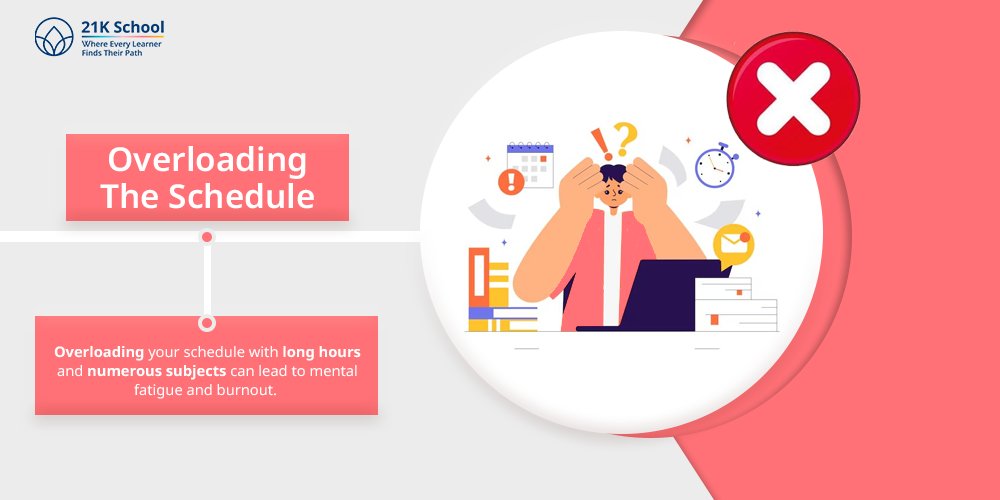
Overloading your schedule with long hours and numerous subjects can lead to mental fatigue and burnout.
Studying effectively is not about how many hours you put in, but how focused and intentional those hours are.
Allow for breaks, rest periods, and lighter days to maintain energy levels and enthusiasm.
2. Neglecting Breaks
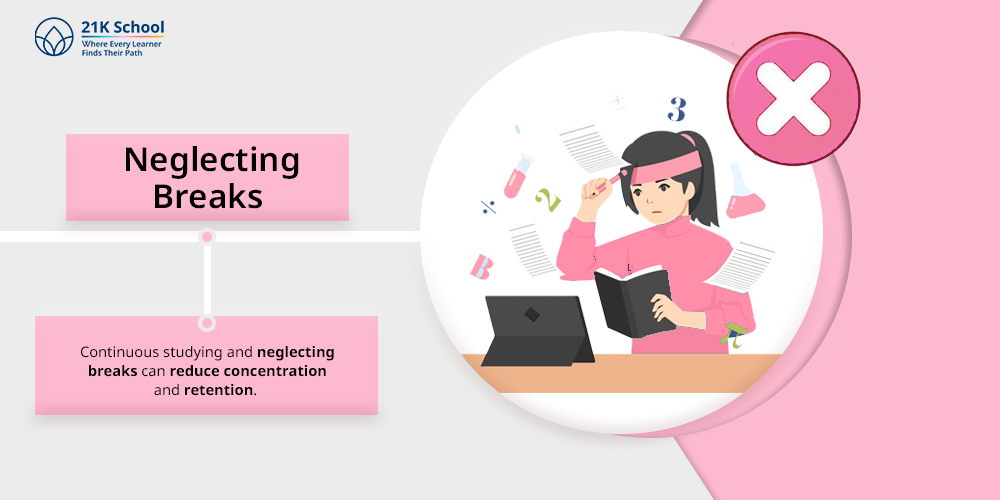
Continuous studying and neglecting breaks can reduce concentration and retention. Breaks are not a waste of time, they are essential for cognitive processing and rejuvenation.
Use short breaks between study sessions and longer breaks after a couple of hours. Activities like stretching, walking, or meditating during breaks can enhance productivity.
3. Lacking Flexibility
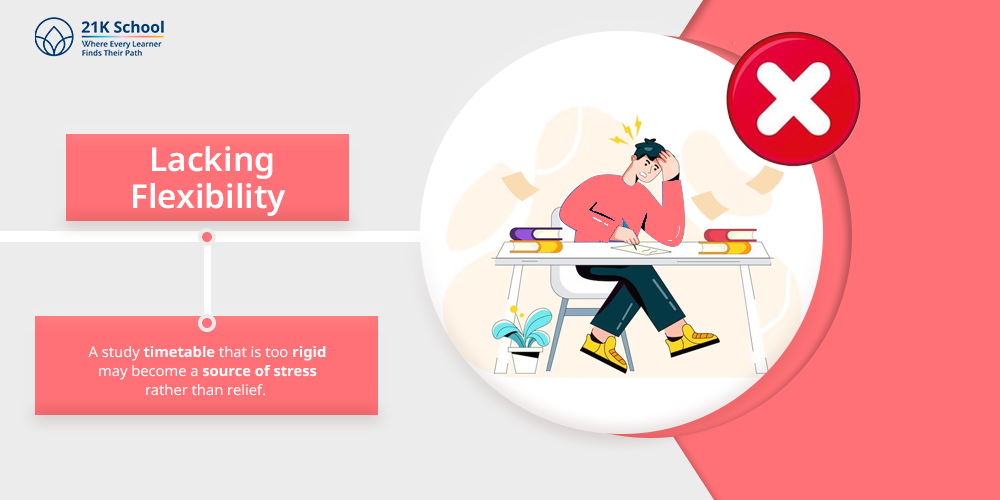
A study timetable that is too rigid may become a source of stress rather than relief.
Read on to learn more about stress relief activities for students .
If you miss a session or fall behind, don’t panic or give up. Instead, reshuffle your timetable and catch up when possible.
Flexibility ensures that your schedule can adapt to real-life situations and remain a tool for success rather than a constraint.
4. Ignoring Sleep and Health
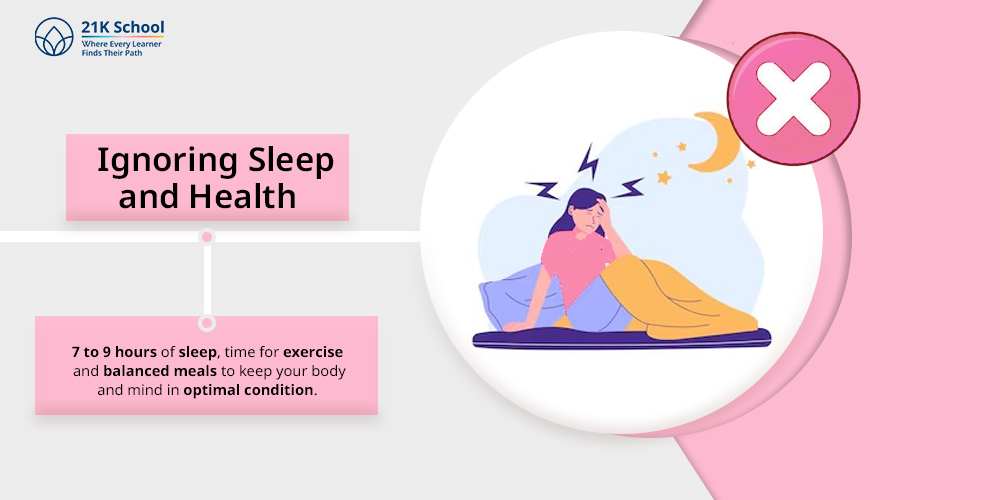
Sacrificing or ignoring sleep and health to study late at night may seem productive in the short term but leads to reduced concentration, memory retention, and overall performance.
Ensure your timetable includes 7 to 9 hours of sleep, time for exercise, and balanced meals to keep your body and mind in optimal condition.
Also Read, How Many Hours of Sleep is Enough for a Student ?
5. Focusing Solely on Favorite Subjects
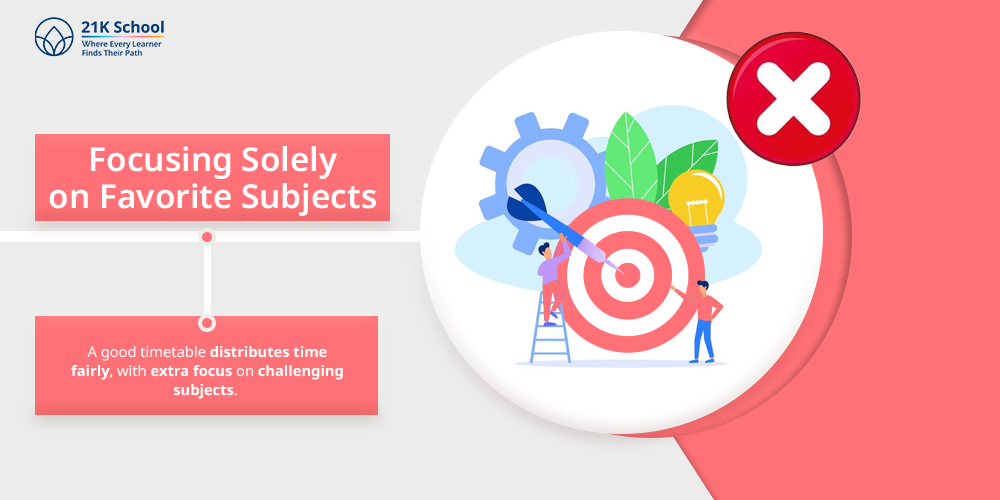
It’s tempting to spend more time on subjects you enjoy and less on those you find difficult. However, this creates an imbalance that can hurt overall academic performance.
A good timetable distributes time fairly, with extra focus on challenging subjects. Rotating subjects and mixing difficult ones with easier topics can also keep motivation levels high.
6. Not Reviewing Past Papers/Practice Tests
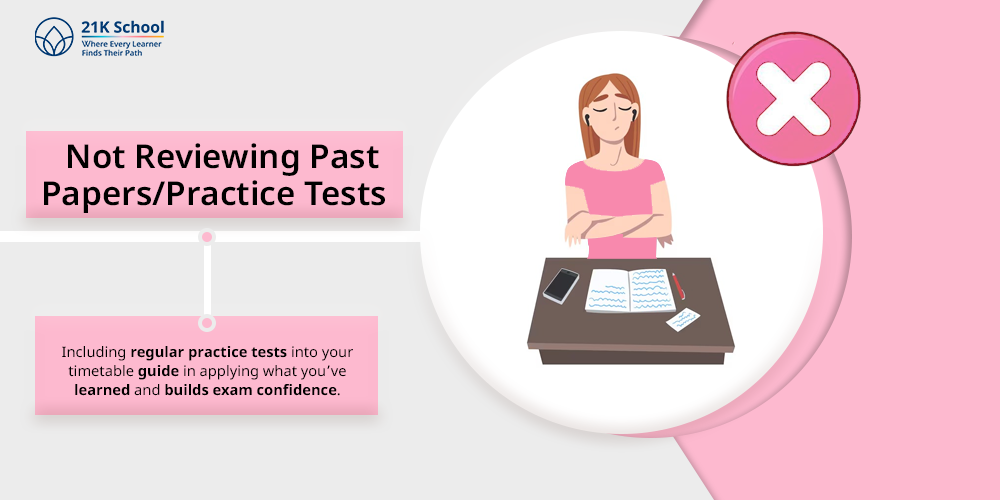
Many students focus on reading and note-taking but neglect active recall through practice tests and past papers.
These tools are invaluable for understanding exam formats, time management, and identifying weak areas.
Including regular practice tests into your timetable guide in applying what you’ve learned and builds exam confidence.
Study Time Table Tools and Apps
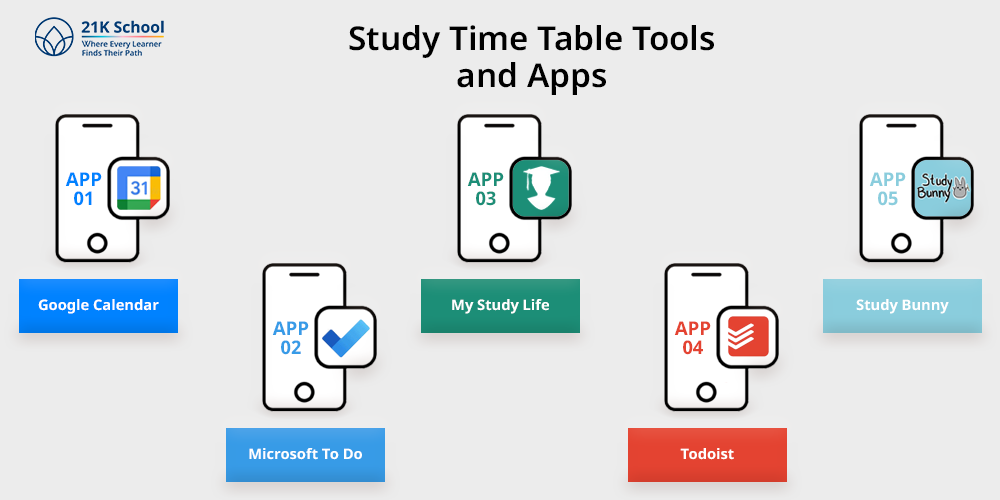
In the 21st century learners are blessed with a lot of tools and apps that make learning easy. One can create and manage study timetables effectively.
Some common examples include dedicated study planner apps like My Study Life, iStudiez Pro, and Power Planner, as well as general task management and calendar apps.
Here’s a detailed outlook:
- Google Calendar
Google Calendar is an essential tool for creating study timetables and managing study time.
It is a seamless scheduling eat which reminds students to stay focused.
- Microsoft To Do
Microsoft To Do can be a useful tool for creating study time tables. The objective is to daily planning, task breakdown, and reminders can be leveraged to structure study sessions.
- My Study Life
A free cross-platform planner designed to help students manage their academic schedules, assignments and exams is called My Study Life.
It is also an ideal and easy to access tool especially designed to reduce learners’ work.
- Todoist
Todoist is a task management application for students but it can be used to create study time tables and manage study schedules.
Here you can organize tasks with due dates, priorities, and recurring intervals. It is suitable for every learner.
- Study Bunny
A gamified study timer and to-do app designed to help students stay focused and organized is known as Study Bunny.
It has various features like customizable study timer, to-do lists, flashcards, and a study tracker ideal for learners.
Conclusion
A well-designed study timetable is your strategic partner in learning. By assessing goals, scheduling intelligently, and sticking with flexibility, you’ll improve productivity, reduce stress, and build strong, sustainable study habits.
Whether you’re preparing for board exams, competitive tests, or self‑improvement goals, the right schedule empowers you to learn more effectively, and enjoy the process.
Let me know if you like printable templates, app-specific tips, mobile-friendly versions, or personalized study schedules tailored to your preferences.

